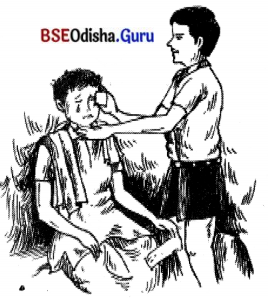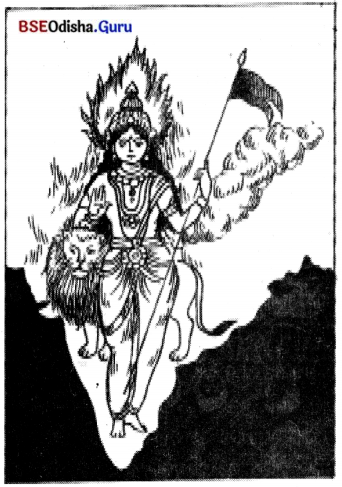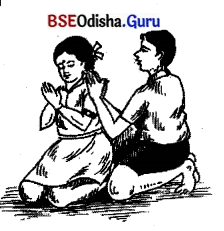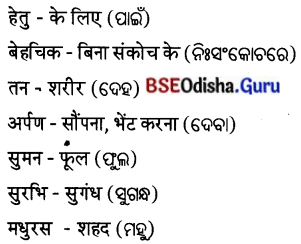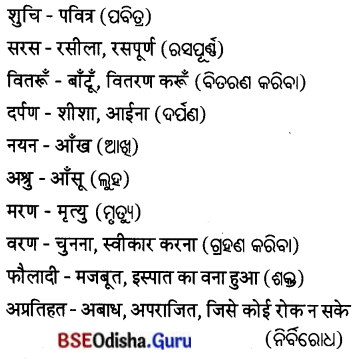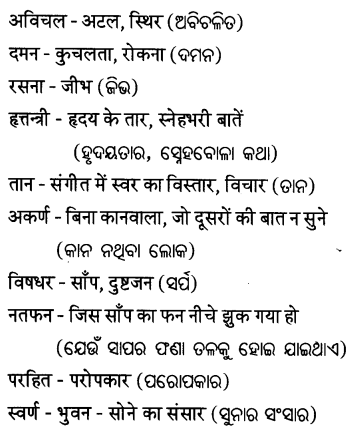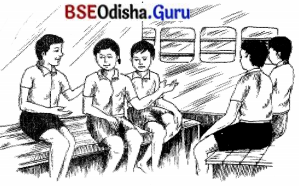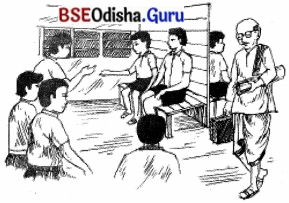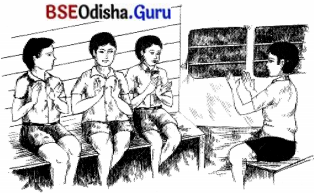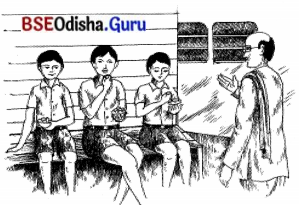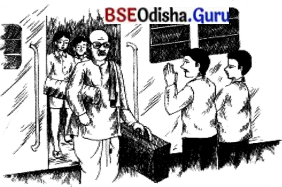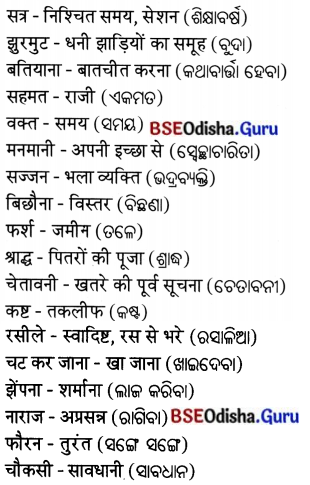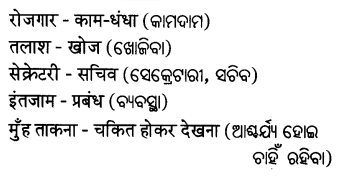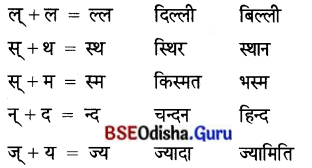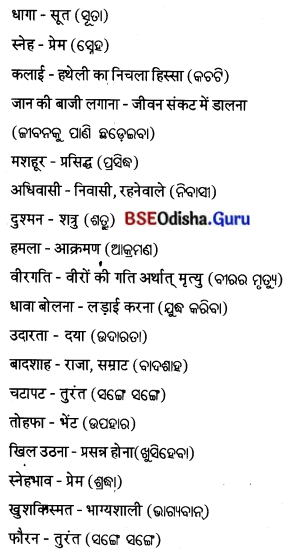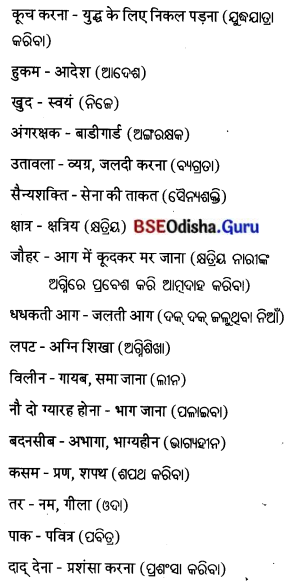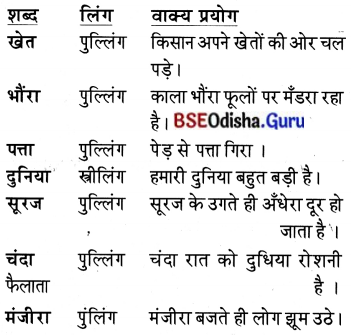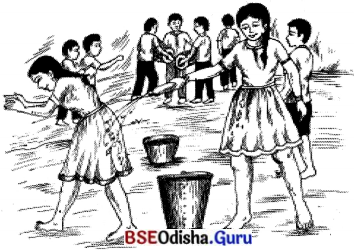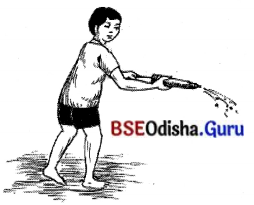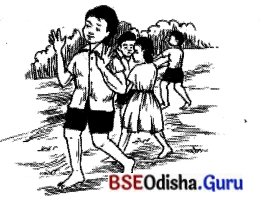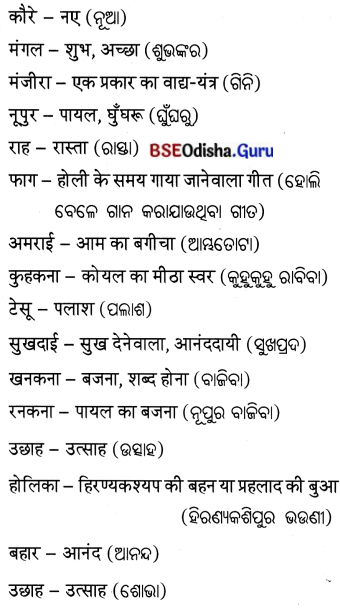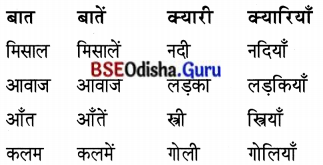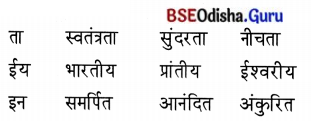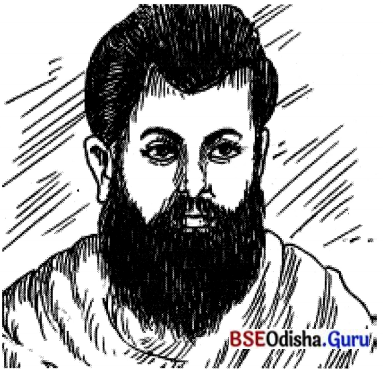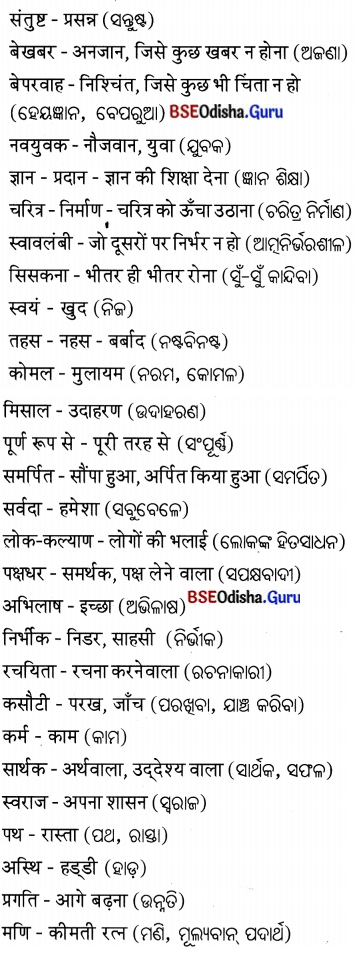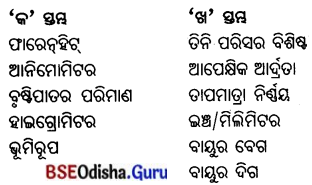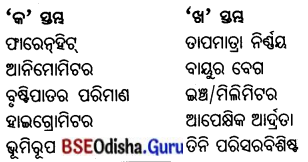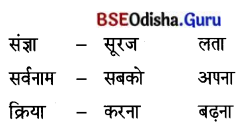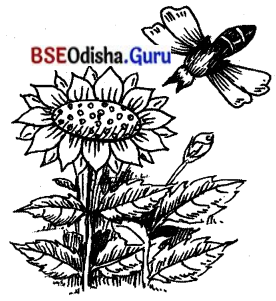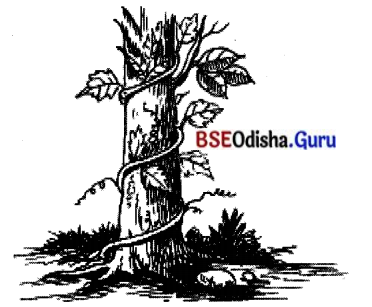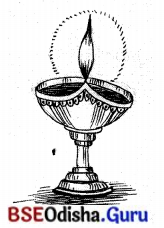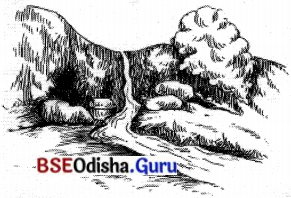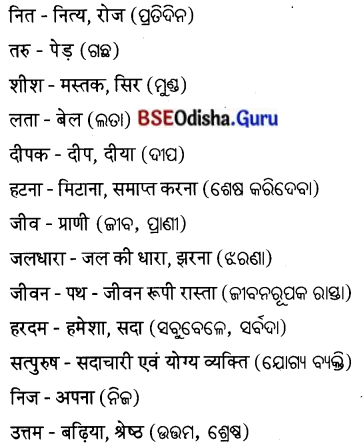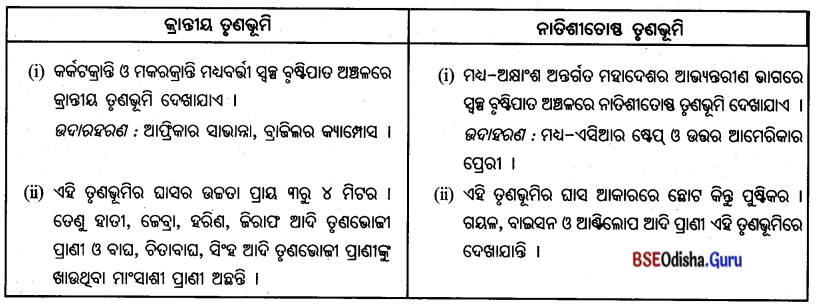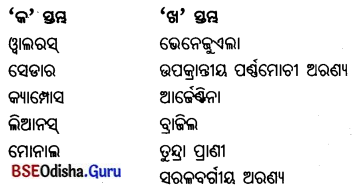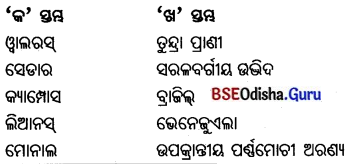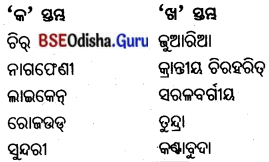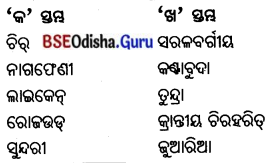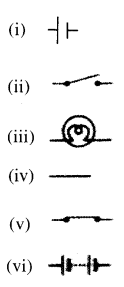Odisha State Board BSE Odisha 7th Class Geography Important Questions Chapter 6 ମାନବୀୟ ପରିବେଶ – ଜନବସତି, ପରିବହନ ଓ ଯୋଗାଯୋଗ Important Questions and Answers.
BE Odisha Class 7 Geography Important Questions Chapter 6 ମାନବୀୟ ପରିବେଶ – ଜନବସତି, ପରିବହନ ଓ ଯୋଗାଯୋଗ
Subjective Type Questions With Answers
ଦୀର୍ଘ ଉତ୍ତରମୂଳକ ପ୍ରଶ୍ନୋତ୍ତର
Question 1.
ଜନବସତି କହିଲେ କ’ଣ ବୁଝାଯାଏ ? ବିଭିନ୍ନ ପ୍ରକାର ଜନବସତି ସଂକ୍ଷେପରେ ବୁଝାଅ ।
Answer:
- ମନୁଷ୍ୟ ଯେଉଁଠାରେ ନିଜ ଘର ନିର୍ମାଣ କରି ବାସ କରେ ତାହାକୁ ଜନବସତି କୁହାଯାଏ । ଜଳର ସୁଲଭତା ଏବଂ ଉର୍ବର ମୁଭିକା ଥିବା ନଦୀ ଉପତ୍ୟକା ଅଞ୍ଚଳମାନଙ୍କରେ ଅନେକ ଜନବସତି ସ୍ଥାପିତ ହୋଇଥାଏ ।
- ଜନବସତିଗୁଡ଼ିକ ସ୍ଥାୟୀ ଜନବସତି ବା ଅସ୍ଥାୟୀ ଜନବସତି ହୋଇପାରେ । ଯେଉଁ ଜନବସତିଗୁଡ଼ିକରେ ମନୁଷ୍ୟ ସ୍ବଳ୍ପ ଅବଧୂ ବାସ କରେ ସେଗୁଡ଼ିକ ଅସ୍ଥାୟୀ ଜନବସତି । ସାଧାରଣତଃ ପାର୍ବତ୍ୟ ଓ ମରୁଭୂମି ଅଞ୍ଚଳ, ତୁନ୍ଦ୍ରାଞ୍ଚଳ ଓ ଘଞ୍ଚ ଅରଣ୍ୟାଞ୍ଚଳରେ ଅସ୍ଥାୟୀ ଜନବସଚ୍ଚି ଦେଖାଯାଏ ।
- ମାତ୍ର ଅନୁକୂଳ ପ୍ରାକୃତିକ ପରିବେଶ ଓ ଜଳବାୟୁ, ଜଳର ସୁଲ ଇତା, ଉର୍ବର କୃଷିଭୂମି, ବ୍ୟବସାୟ, ବାଣିଜ୍ୟ, ସେବାକେନ୍ଦ୍ର ମାନଙ୍କରେ ସ୍ଥାୟୀ ଜନବସତି ଗଢ଼ିଉଠେ । ସେହିପରି ଜନବସତି ଗ୍ରାମ୍ୟ ଜନବସତି ଓ ନଗର ଜନବସତି ଭାବେ ଶ୍ରେଣୀଭୁକ୍ତ ।
- କୃଷି ଉପରେ ନିର୍ଭର କରି ସ୍ଥାପିତ ହୋଇଥିବା ଜନବସତିକୁ ଗ୍ରାମ୍ୟ ଜନବସତି କୁହାଯାଏ । ସେହି ପରି କ୍ରମବର୍ଦ୍ଧିଷ୍ଣୁ ଜନସଂଖ୍ୟାର ବିଭିନ୍ନ ଆବଶ୍ୟକତା ପୂରଣ ପାଇଁ ଉତ୍ପାଦନ ଶୈଳୀରେ ପରିବର୍ତ୍ତନ ଘଟିଲା ।
- ବିଭିନ୍ନ ନଦୀ ଉପତ୍ୟକାମାନଙ୍କରେ ଏହାକୁ କେନ୍ଦ୍ରକରି ଉତ୍ପାଦନ କେନ୍ଦ୍ର, ବିଭିନ୍ନ ବାଣିଜ୍ୟ ଓ ବ୍ୟବସାୟ କେନ୍ଦ୍ର, ସେବାକେନ୍ଦ୍ର ଆଦି ଜନବସତି ଗଢ଼ିଉଠିଲା, ଯାହାକୁ ସହର ବା ନଗର ଜନବସତି କୁହାଯାଏ ।
Question 2.
ସହର ଜନବସତି କିପରି ଗଢ଼ିଉଠିଲା ଓ ଏହି ଜନବସତି ସଂକ୍ଷେପରେ ବୁଝାଅ ।
Answer:
- ନଦୀ ଉପତ୍ୟକାମାନଙ୍କରେ ଜଳର ସୁଲଭତା, ଉର୍ବର ମୃତ୍ତିକା ଓ କୃଷିପାଇଁ ଅନୁକୂଳ ପରିବେଶ ହେତୁ ସେଠାରେ ଅନେକ ଜନବସତି ସ୍ଥାପିତ ହେଲା ।
- କୃଷିଜାତ ପଦାର୍ଥ ଓ ଅନ୍ୟାନ୍ୟ ଆବଶ୍ୟକୀୟ ବସ୍ତୁର ଆଦାନପ୍ରଦାନ ପାଇଁ ବ୍ୟବସାୟ, ବାଣିଜ୍ୟ ଓ ଗମନାଗମନ ପଥର ବିକାଶ ହେଲା ।
- ଲୋକସଂଖ୍ୟା ବଢ଼ିବା ସହିତ ସେମାନଙ୍କ ଆବଶ୍ୟକତା ପୂରଣ ନିମିତ୍ତ ଉତ୍ପାଦନ ଶୈଳୀରେ ପରିବର୍ତ୍ତନ ଘଟିଲା । ସେଥିପାଇଁ ଉତ୍ପାଦନ କେନ୍ଦ୍ର, ବିଭିନ୍ନ ବ୍ୟବସାୟ, ବାଣିଜ୍ୟକେନ୍ଦ୍ର ଓ ସେବାକେନ୍ଦ୍ର ଆଦି ଜନବସତିରେ ସ୍ଥାପିତ ହେଲା । ଏହିପରି ସହର ଜନବସତି ଗଢ଼ିଉଠିଲା ।
- ସହର ଜନବସତିଗୁଡ଼ିକ ସଘନ, ସକେନ୍ଦ୍ରିକ ଓ ବ୍ୟାପକ ହୋଇଥାଏ ।
- ଜନବସତିର ଲୋକେ ଉତ୍ପାଦନ, ବ୍ୟବସାୟ, ବାଣିଜ୍ୟ, ସରକାରୀ ଓ ବେସରକାରୀ ସେବା କ୍ଷେତ୍ରରେ ନିଯୁକ୍ତ ହୋଇଥାନ୍ତି । ଏହାର ଜନସଂଖ୍ୟା ପାଞ୍ଚହଜାରରୁ ଅଧିକହୋଇଥାଏ ।

Question 3.
ଆମ ଦେଶର ଆଭ୍ୟନ୍ତରୀଣ ଜଳ ପରିବହନ ସମ୍ପର୍କରେ ସଂକ୍ଷେପରେ ଲେଖ ।
Answer:
- ଦେଶ ମଧ୍ୟରେ ଥିବା ସୁନାବ୍ୟା ନଦୀ, ହ୍ରଦ ଓ କେନାଲ ମଧ୍ୟଦେଇ ଆଭ୍ୟନ୍ତରୀଣ ଜଳ ପରିବହନ କରାଯାଇଥାଏ ।
- ଆମ ଦେଶର ଗଙ୍ଗା, ବ୍ରହ୍ମପୁତ୍ର, ମହାନଦୀ ଓ କାବେରୀ ନଦୀଗୁଡ଼ିକ ମଧ୍ୟଦେଇ ଆଭ୍ୟନ୍ତରୀଣ ଜଳ ପରି ବହନ ହୋଇଥାଏ ।
- ଆମ ରାଜ୍ୟର ଚିଲିକା ହ୍ରଦ ମଧ୍ୟରେ ଥିବା ପାରିକୁଦ, ମାଲୁଦ, କାଳିଜାଈ ଆଦି ସ୍ଥାନକୁ ଲଞ୍ଚ, ଷ୍ଟିମର, ଡଙ୍ଗା ଆଦି ସାହାଯ୍ୟରେ ଯାତାୟାତ କରାଯାଏ ।
- ଆନ୍ଧ୍ରପ୍ରଦେଶ ଓ ତାମିଲନାଡୁର ବକିଂହାମ୍ କେନାଲ, କେରଳର କେତେକ କେନାଲ ଦ୍ବାରା ଜଳ ପରିବହନ ହୋଇଥାଏ ।
- ଆମ ରାଜ୍ୟର ତାଳଦଣ୍ଡା କେନାଲ, ପଟ୍ଟାମୁଣ୍ଡାଇ କେନାଲ ଦ୍ଵାରା ଉପକୂଳବର୍ତ୍ତୀ ଅଞ୍ଚଳରେ ଜଳ ପରିବହନର ବ୍ୟବସ୍ଥା ରହିଛି ।
Question 4.
ଭାରତର ସାମୁଦ୍ରିକ ବହିର୍ବାଣିଜ୍ୟ କିପରି କରାଯାଇଥାଏ ଲେଖ ।
Answer:
- ଭାରତର ସାମୁଦ୍ରିକ ବହିର୍ବାଣିଜ୍ୟ କାରବାର ମୁଖ୍ୟତଃ ଚାରିଗୋଟି ସମୁଦ୍ରପଥ ମାଧ୍ୟମରେ କରାଯାଇଥାଏ ।
- ସୁଏଜ କେନାଲ ପଥ ଦେଇ ଇଉରୋପୀୟ ଦେଶମାନଙ୍କ ସହ ଭାରତର ବାଣିଜ୍ୟ କାରବାର ହୋଇଥାଏ ।
- ସିଙ୍ଗାପୁର ସମୁଦ୍ର ପଥ ଦେଇ ଦକ୍ଷିଣ-ପୂର୍ବ ଏସିଆ, ଜାପାନ, ଯୁକ୍ତରାଷ୍ଟ୍ର ଆମେରିକା ଓ କାନାଡ଼ା ସହ ଭାରତ ବାଣିଜ୍ୟ କାରବାର କରିଥାଏ ।
- ସେହିପରି ପଶ୍ଚିମ ଆଫ୍ରିକୀୟ ଦେଶ ଓ ଦକ୍ଷିଣ ଆମେରିକୀୟ ଦେଶଗୁଡ଼ିକ ସହିତ ଉତ୍ତମାଶା ଅନ୍ତରୀପ ପଥ ଦେଇ ଭାରତର ବାଣିଜ୍ୟ କାରବାର ହୋଇଥାଏ ।
- ଅଷ୍ଟ୍ରେଲିଆ ପଥ ଦେଇ ଅଷ୍ଟ୍ରେଲିଆ ଓ ନିଉଜିଲ୍ୟାଣ୍ଡ ସହିତ ଭାରତର ବହିର୍ବାଣିଜ୍ୟ ସମ୍ପାଦିତ ହୋଇଥାଏ ।
Question 5.
ଅତୀତରୁ ବର୍ତ୍ତମାନ ଯାଏ ଯୋଗାଯୋଗ ବ୍ୟବସ୍ଥାର ବିକାଶ ସମ୍ପକରେ ଲେଖ ।
Answer:
- ଅତୀତରେ ଜଣେ ବ୍ୟକ୍ତି ବା ପାରା ଦ୍ଵାରା ସମ୍ବାଦ ପ୍ରେରଣ କରାଯାଉଥିଲା । ପରବର୍ତ୍ତୀ କାଳରେ କୌଣସି ଉଚ୍ଚ ସ୍ଥାନରେ ନିଆଁ ଜାଳି କିମ୍ବା କୌଣସି ଲୋକଦ୍ଵାରା ବାଦ୍ୟ ବା ଧେଣ୍ଡୁରା ବଜାଇ ଲୋକମାନଙ୍କୁ ଖବର ଦିଆଯାଉଥିଲା ।
- କ୍ରମେ ଡାକ ଓ ତାର ବ୍ୟବସ୍ଥାର ଆରମ୍ଭ ହେବାପରେ ଚିଠିପତ୍ର, ଟେଲିଗ୍ରାମ୍ ମାଧ୍ୟମରେ ଯୋଗାଯୋଗ ବ୍ୟବସ୍ଥା କରାଗଲା ।
- ତା’ପରେ ଦୂରସଞ୍ଚାର ମାଧ୍ୟମରେ ଟେଲିଫୋନ୍ ଓ ଟେଲିଗ୍ରାମ୍, ଟେଲେକ୍ ସ ଓ ପରେ ବେତାର ବା ରେଡ଼ିଓ ଯନ୍ତ୍ର ଓ ଟେଲିଭିଜନ ଦ୍ବାରା ଯୋଗାଯୋଗ ବ୍ୟବସ୍ଥା କ୍ଷିପ୍ର ହେଲା ଓ ସମୟ ଅପଚୟ କମ୍ ହେଲା । ସର୍ବଶେଷରେ ସେଲ୍ଫୋନ୍, ଇଣ୍ଟରନେଟ୍ ଆଦିର ପ୍ରଚଳନ ଫଳରେ ଯୋଗାଯୋଗ କ୍ଷେତ୍ରରେ ବୈପ୍ଳବିକ ପରିବର୍ତ୍ତନ ଘଟିଲା ।
- ଫଳରେ ମୁହୂର୍ଭକ ମଧ୍ୟରେ ପୃଥିବୀର କୋଣ ଓ ଅନୁକୋଣରେ ଥିବା ଲୋକଙ୍କ ମଧ୍ୟରେ କଥାବାର୍ତ୍ତା ଓ ଭାବ ବିନିମୟ ସମ୍ଭବ ହୋଇପାରିଲା । ଘରେ ବସି ରେଳ, ବିମାନ, ହୋଟେଲ, ପ୍ରେକ୍ଷାଳୟ ଆଦିର ସ୍ଥାନ ସଂରକ୍ଷଣ, ବ୍ୟାକିଂ ସେବା, ବିଭିନ୍ନ ସାମଗ୍ରୀର କ୍ରୟବିକ୍ରୟ କରାଯାଇ ପାରିଲା ।
- ପୃଥିବୀରେ ଥିବା ବିଭିନ୍ନ ବ୍ୟକ୍ତିବିଶେଷ, ଅନୁଷ୍ଠାନ ଏବଂ ସଂସ୍ଥା ସହ ଏପ୍ରକାର ଅନ୍ତଃସଂଯୋଗୀକରଣ ବ୍ୟବସ୍ଥାର ଉନ୍ନତି ହେତୁ ଆମ ପୃଥବୀ ଏକ ବିରାଟ ଗ୍ରାମରେ ପରିଣତ ହୋଇଛି ।
ସଂକ୍ଷିପ୍ତ ଉତ୍ତରମୂଳକ ପ୍ରଶ୍ନୋତ୍ତର
Question 1.
ଗ୍ରାମ୍ୟ ଜନବସତି କିପରି ସୃଷ୍ଟି ହେଲା ?
Answer:
- କାଳକ୍ରମେ ମନୁଷ୍ୟ କୃଷିକାର୍ଯ୍ୟ କରି ଶିଖୁଲା । କୃଷିକାର୍ଯ୍ୟ ଶ୍ରମଭିଭିକ ହୋଇଥିବାରୁ ତାକୁ ପରିବାର ସହିତ କୃଷିକ୍ଷେତ୍ର ନିକଟରେ ରହିବାକୁ ପଡ଼ିଲା। ବଳକା କୃଷିଜାତ ପଦାର୍ଥକୁ ସାଇତି ରଖୁବା ନିମନ୍ତେ ସ୍ଥାୟୀଗୃହ ନିର୍ମାଣ କରିବାର ଆବଶ୍ୟକତା ପଡ଼ିଲା।
- ମନୁଷ୍ୟକୁ ଏପରି ସ୍ଥାୟୀ ଭାବରେ ନିଜର ପରିବାର ତଥା ଅନ୍ୟର ପରିବାର ସହିତ ମିଶି ଏକ ଗୋଷ୍ଠୀଭାବେ ବସବାସ କରିବାକୁ ପଡ଼ିଲା। ଏହାଦ୍ଵାରା ଏକ ସ୍ଥାୟୀ ଜନବସତି ସୃଷ୍ଟି ହେଲା। କୃଷି ଉପରେ ନିର୍ଭର କରି ସ୍ଥାପିତ ହୋଇଥିବା ଏହି ପ୍ରକାର ଜନବସତିକୁ ଗ୍ରାମ୍ୟ ଜନବସତି କୁହାଗଲା ।
Question 2.
ସହର ବା ନଗର ଜନବସତି କିପରି ସ୍ଥାପିତ ହେଲା ?
Answer:
- କୃଷିଜାତ ପଦାର୍ଥ ଏବଂ ଅନ୍ୟାନ୍ୟ ଆବଶ୍ୟକୀୟ ବସ୍ତୁର ଆଦାନ ପ୍ରଦାନ ପାଇଁ ବ୍ୟବସାୟ, ବାଣିଜ୍ୟ ଓ ଗମନାଗମନ ପଥର ବିକାଶ ହେଲା। ଅଧିକ ସଂଖ୍ୟକ ଲୋକଙ୍କର ଖାଦ୍ୟ, ବସ୍ତ୍ର, ଗୃହ ଉପକରଣ ଇତ୍ୟାଦି ଆବଶ୍ୟକତା ପୂରଣ କରିବାପାଇଁ ଉତ୍ପାଦନ ଶୈଳୀରେ ପରିବର୍ତ୍ତନ କରାଗଲା ।
- ସେଥିପାଇଁ ଉତ୍ପାଦନ କେନ୍ଦ୍ର ବିଭିନ୍ନ ବ୍ୟବସାୟ ଓ ବାଣିଜ୍ୟକେନ୍ଦ୍ର, ସେବାକେନ୍ଦ୍ର ଇତ୍ୟାଦି ଜନବସତି ସ୍ଥାପିତ ହେଲା। ଏହି ପ୍ରକାର ଜନବସତିକୁ ସହର ବା ନଗର ଜନବସତି କୁହାଗଲା।
Question 3.
ମାନବୀୟ ପରିବେଶ ବା ସାଂସ୍କୃତିକ ପରିବେଶ କାହାକୁ କୁହାଯାଏ ?
Answer:
- ମନୁଷ୍ୟ ନିଜର ସୁଖ ସୁବିଧା ପାଇଁ ଜ୍ଞାନ ଓ କାରିଗରୀ କୌଶଳର ଉପଯୋଗ କରି ପ୍ରାକୃତିକ ପରିବେଶରେ କେତେକ ପରିବର୍ତ୍ତନ ଆଣିଥାଏ ।
- ଏହି ମନୁଷ୍ୟକୃତ ପରିବେଶକୁ ମାନବୀୟ ପରିବେଶ ବା ସାଂସ୍କୃତିକ ପରିବେଶ କୁହାଯାଏ ।

Question 4.
ଅତୀତରେ ସମ୍ବାଦ ପ୍ରେରଣ କାର୍ଯ୍ୟ କିପରି କରାଯାଉଥିଲା ?
Answer:
- ଅତୀତରେ ସମ୍ବାଦ ପ୍ରେରଣ ଏକ ବ୍ୟକ୍ତିଦ୍ଵାରା କିମ୍ବା ପାରା ସାହାଯ୍ୟରେ କରାଯାଉଥିଲା ।
- ରାଜାମାନେ ସେମାନଙ୍କ ଯୁଦ୍ଧଜୟର ଖବର କୌଣସି ଉଚ୍ଚ ସ୍ଥାନରେ ନିଆଁ ଜାଳି କିମ୍ବା ତାଙ୍କର ଆଦେଶ ବା ନିର୍ଦ୍ଦେଶ ରାଜକର୍ମଚାରୀମାନେ ବାଦ୍ୟ ବା ଧେଣ୍ଡୁରା ବଢାଇ ରାଜ୍ୟବାସୀଙ୍କୁ ଜଣାଉଥିଲେ।
Question 5.
ଭାରତରେ ଡାକ ଓ ତାର ସେବା କେବେ ଆରମ୍ଭ ହେଲା ? ଡାକବିଭାଗ ଦ୍ଵାରା କେଉଁ କେଉଁ ବ୍ୟବସ୍ଥା କାର୍ଯ୍ୟକାରୀ କରାଯାଏ ?
Answer:
- ଭାରତରେ ୧୮୫୪ ମସିହାରେ ଡାକ ଓ ତାର ସେବା ଆରମ୍ଭ ହେଲା ।
- ଡାକ ବିଭାଗ ଦ୍ୱାରା ଚିଠିପତ୍ର ବଣ୍ଟନ, ମନିଅର୍ଡ଼ର ବ୍ୟବସ୍ଥା ଓ ଡାକଘର ଜୀବନବୀମା ବ୍ୟବସ୍ଥା କାର୍ଯ୍ୟକାରୀ କରାଯାଏ ।
Question 6.
ସ୍ଥାୟୀ ଜନବସତି କିପରି ସୃଷ୍ଟି ହେଲା ?
Answer:
- ମନୁଷ୍ୟ କୃଷିକାର୍ଯ୍ୟ ଶିଖୁଲା ପରେ ତାକୁ ପରିବାର ସହିତ କୃଷିକ୍ଷେତ୍ର ନିକଟରେ ରହିବାକୁ ପଡ଼ିଲା । ଏହାଫଳରେ ସେ ସୁଚାରୁରୂପେ କୃଷିକାର୍ଯ୍ୟ କରିବା ଏବଂ ବଳକା କୃଷିଜାତ ପଦାର୍ଥକୁ ସାଇତି ରଖୁବା ନିମନ୍ତେ ସ୍ଥାୟୀ ଗୃହ ନିର୍ମାଣ କଲା ।
- ମନୁଷ୍ୟକୁ ଏପରି ସ୍ଥାୟୀ ଭାବରେ ନିଜର ପରିବାର ତଥା ଅନ୍ୟର ପରିବାର ସହିତ ମିଶି ଏକ ଗୋଷ୍ଠୀ ଭାବେ ବସବାସ କଲା ଓ ଏହାଦ୍ଵାରା ଏକ ସ୍ଥାୟୀ ଜନବସତି ସୃଷ୍ଟି ହେଲା । ସେହି ଜନବସତିରେ ସ୍ଥାପିତ ହେଲା । ଏହି ପ୍ରକାର ଜନବସତିଗୁଡ଼ିକ ନଗର ଜନବସତି ନାମରେ ପରିଚିତ ହେଲା । ତେଣୁ ପ୍ରାଚୀନ କାଳରେ ପୃଥିବୀର ବିଭିନ୍ନ ନଦୀ ଉପତ୍ୟକାମାନଙ୍କରେ ନଗର ସଭ୍ୟତା ବିକାଶ ଲାଭ କରିଥିଲା ।
Question 7.
ଆଜିକାଲି ଭାରତରୁ ଯେକୌଣସି ଦେଶକୁ ଯାତ୍ରା କରିବାପାଇଁ ଖୁବ୍ କମ୍ ସମୟ ଲାଗୁଛି ।
Answer:
- ବର୍ତ୍ତମାନ ଉଡ଼ାଜାହାଜ ଏବଂ ସୁପରସୋନିକ୍ ଜେଟ୍ ବିମାନ ସାହାଯ୍ୟରେ ଆକାଶପଥରେ ପରିବହନ ଅଧ୍ଵକ କ୍ଷିପ୍ରତର ହୋଇପାରୁଛି ।
- ତେଣୁ ଆଜିକାଲି ଭାରତରୁ ପୃଥିବୀର ଯେକୌଣସି ଦେଶକୁ ଯାତ୍ରା କରିବାପାଇଁ ଖୁବ୍ କମ୍ ସମୟ ଲାଗୁଛି ।
Question 8.
ପାହାଡ଼ିଆ ଅଞ୍ଚଳରେ ବିକ୍ଷିପ୍ତ ଜନବସତି ଦେଖାଯାଏ ।
Answer:
- ପାହାଡ଼ିଆ ଅଞ୍ଚଳରେ ଲୋକମାନେ ମୁଖ୍ୟତଃ ପଶୁପାଳନ ଓ ଜଙ୍ଗଲଜାତ ଦ୍ରବ୍ୟ ସଂଗ୍ରହ କରି ଜୀବିକା ନିର୍ବାହ କରନ୍ତି ।
- ଏହି ଅଞ୍ଚଳ ଜନବସତି ପାଇଁ ପ୍ରତିକୂଳ । ତେଣୁ ଏଠାରେ ବିକ୍ଷିପ୍ତ ଜନବସତି ଦେଖାଯାଏ ।
Question 9.
ଆଜିକାଲି ପୃଥିବୀ ଗୋଟିଏ ବଡ଼ ଗ୍ରାମରେ ପରିଣତ ହୋଇପାରିଛି ।
Answer:
- ଆଜିକାଲି ପୃଥିବୀରେ ଯୋଗାଯୋଗ କ୍ଷେତ୍ରରେ ଇଣ୍ଟରନେଟ୍, ସେଲ୍ଫୋନ୍, ଓୟାରଲେସ୍, ଫାକ୍ଟ୍ସ, ଟେଲେକ୍ସ ବ୍ୟବସ୍ଥା ମାଧ୍ୟମରେ ଅଳ୍ପ ସେକେଣ୍ଡ ମଧ୍ୟରେ ପୃଥିବୀର ଯେକୌଣସି ସ୍ଥାନକୁ ଖବର ପଠାଯାଇ ପାରୁଛି ।
- ସେରୁଲାର ଫୋନ୍ ଏବଂ ଇଣ୍ଟରନେଟ୍ରେ ଭିଡିଓ କନ୍ ଫରେନ୍ସ ମାଧ୍ୟମରେ ପୃଥିବୀରେ ଥିବା ଲୋକମାନଙ୍କ ମଧ୍ୟରେ ସିଧାସଳଖ କଥାବାର୍ତ୍ତା ସହ ସେମାନଙ୍କୁ ମଧ୍ୟ ଦେଖୁହେଉଛି । ପୃଥିବୀର ବିଭିନ୍ନ କୋଣ ଓ ଅନୁକୋଣରେ ଥିବା ଲୋକମାନଙ୍କ ମଧ୍ୟରେ ମୁହୂର୍ଭକ ମଧ୍ୟରେ କଥାବାର୍ତ୍ତା ଓ ଭାବ ବିନିମୟ ହୋଇପାରୁଥିବା ହେତୁ ଆମ ପୃଥିବୀ ଏକ ବିରାଟ ଗ୍ରାମରେ ପରିଣତ ହୋଇପାରିଛି ।
Question 10.
ଦୂରଦର୍ଶନ ଏକ ସର୍ବଶ୍ରେଷ୍ଠ ଓ ଶକ୍ତିଶାଳୀ ଗଣମାଧ୍ୟମ ।
Answer:
- ଦୂରଦର୍ଶନ ମାଧ୍ୟମରେ ସମ୍ବାଦ ପରିବେଷଣ, ଶିକ୍ଷଣୀୟ କାର୍ଯ୍ୟକ୍ରମ ପ୍ରଚାର ଓ ବିଭିନ୍ନ ମନୋରଞ୍ଜନ କାର୍ଯ୍ୟକ୍ରମ ଦୃଶ୍ୟମାନ – ଓ ଶବ୍ଦମାନ ରୂପରେ ପରିବେଷଣ କରାଯାଇଥାଏ ।
- ଏହା ଦୃଶ୍ୟଶ୍ରାବ୍ୟ ମାଧ୍ୟମ ହୋଇଥିବାରୁ ଏବଂ ଲୋକମାନଙ୍କ ମନରେ ଅଧିକ ପ୍ରଭାବ ପକାଉଥିବାରୁ ଏହାକୁ ସର୍ବଶ୍ରେଷ୍ଠ ଓ ଶକ୍ତିଶାଳୀ ଗଣମାଧ୍ଯମ କୁହାଯାଏ ।

Question 11.
ପରିବହନ ପାଇଁ ହେଲିକପ୍ଟର ଏକ ଗୁରୁତ୍ଵପୂର୍ଣ୍ଣ ଭୂମିକା ଗ୍ରହଣ କରିଥାଏ ।
Answer:
- ଅଗମ୍ୟ ସ୍ଥାନରୁ ହେଲିକପ୍ଟରଦ୍ଵାରା ଯାଇହୁଏ । ବନ୍ୟା, ଭୂମିକମ୍ପ ଓ ଅନ୍ୟାନ୍ୟ ପ୍ରାକୃତିକ ବିପର୍ଯ୍ୟୟ ସମୟରେ ବିପନ୍ନ ଲୋକଙ୍କୁ ରିଲିଫ୍ ଖାଦ୍ୟ, ଜଳ ଓ ପୋଷାକ ତଥା ଔଷଧ ବଣ୍ଟନ କରିବାରେ ଏହା ସାହାଯ୍ୟ କରିଥାଏ ।
- ହେଲିକପ୍ଟରକୁ ଯୁଦ୍ଧ, ବନ୍ୟା ସମୟରେ ବିପନ୍ନଙ୍କ ଉଦ୍ଧାର କାର୍ଯ୍ୟରେ ବ୍ୟବହାର କରାଯାଏ ।
ପାର୍ଥକ୍ୟ ଦର୍ଶାଅ
Question 1.
ଅସ୍ଥାୟୀ ଜନବସତି ଓ ସ୍ଥାୟୀ ଜନବସତି
Answer:

Question 2.
ସକେନ୍ଦ୍ରିକ ଜନବସତି ଓ ବିକ୍ଷିପ୍ତ ଜନବସତି

Question 3.
ଅସ୍ଥାୟୀ ଜନବସତି କେଉଁ ଅଞ୍ଚଳରେ ଦେଖାଯାଏ ? ଏହି ଅଞ୍ଚଳର ଅଧିବାସୀମାନଙ୍କ ଜୀବନଯାପନ ପ୍ରଣାଳୀ କିପରି ?
Answer:
- ଅସ୍ଥାୟୀ ଜନବସତିଗୁଡ଼ିକ ସାଧାରଣତଃ ପାର୍ବତ୍ୟ ଓ ମରୁଭୂମି ଅଞ୍ଚଳ, ବରଫମୟ ତୁନ୍ଦ୍ରାଞ୍ଚଳ ଓ ଘନ ଅରଣ୍ୟ ଥିବା ଅଞ୍ଚଳରେ ଦେଖାଯାଏ ।
- ଏହି ଅଞ୍ଚଳର ଲୋକମାନେ ଅରଣ୍ୟରୁ ଫଳମୂଳ ସଂଗ୍ରହ, ପଶୁପକ୍ଷୀ ଶିକାର, ଇଟା ତିଆରି ଇତ୍ୟାଦି କାର୍ଯ୍ୟ କରି ଜୀବିକା ନିର୍ବାହ କରିଥା’ନ୍ତି ।
Question 4.
ଗ୍ରାମ୍ୟ ଜନବସତିରେ ଘରଗୁଡ଼ିକର ନିର୍ମାଣ ଶୈଳୀ କିପରି ?
Answer:
- ଗ୍ରାମ୍ୟ ଜନବସତିରେ ଲୋକମାନଙ୍କ ଘରଗୁଡ଼ିକ ପରିବେଶକୁ ଖାପ ଖୁଆଇଲା ଭଳି ନିର୍ମିତ ହୋଇଥାଏ ।
- ଅତ୍ୟଧିକ ବୃଷ୍ଟିପାତ ହେଉଥିବା ଅଞ୍ଚଳରେ ବାସଗୃହର ଛାତଗୁଡ଼ିକ ଗଡ଼ାଣ୍ତିଆ ହୋଇଥାଏ । ସେହିପରି ବର୍ଷାପାଣି ଜମିରହୁଥିବା ଅଞ୍ଚଳରେ ଘରଗୁଡ଼ିକ ଉଚ୍ଚା ସ୍ଥାନ ବା ମଞ୍ଚା ଉପରେ ନିର୍ମାଣ କରାଯାଇଥାଏ ।
- ଉଷ୍ଣ ଜଳବାୟୁ ଅଞ୍ଚଳରେ ଲୋକମାନଙ୍କ ଘରର କାନ୍ଥ ମାଟିରେ ତିଆରି ମୋଟା କାନ୍ଥ ଓ ଛପରଘର ହୋଇଥାଏ ।
Question 5.
ଜନସଂଖ୍ୟାର ଘନତ୍ଵ କାହା ଉପରେ ନିର୍ଭର କରେ ?
Answer:
ଭୂମିର ଗଠନ, ଜଳବାୟୁ, ପରିବେଶ, ସମ୍ବଳ, ସାମାଜିକ ଓ ଅର୍ଥନୈତିକ କାରଣଗୁଡ଼ିକ ଉପରେ ଜନସଂଖ୍ୟାର ଘନତ୍ବ ନିର୍ଭର କରେ ।
Question 6.
ପରିବହନ ବ୍ୟବସ୍ଥା କିପରି ଆର୍ଥିକ ବିକାଶରେ ସାହାଯ୍ୟ କରିଥାଏ ?
Answer:
- ପରିବହନ ବ୍ୟବସ୍ଥା ଦ୍ଵାରା ଲୋକମାନେ ଏକ ସ୍ଥାନରୁ ଅନ୍ୟ ଏକ ସ୍ଥାନକୁ ଗମନାଗମନ କରିଥାନ୍ତି ।
- ପଣ୍ୟଦ୍ରବ୍ୟ ଓ କଞ୍ଚାମାଲ ସହଜରେ ଏକ ସ୍ଥାନରୁ ଅନ୍ୟ ଏକ ସ୍ଥାନକୁ ନେବା ଆଣିବା କରାଯାଇଥାଏ । ତେଣୁ କୌଣସି ଦେଶର ଆର୍ଥିକ ବିକାଶରେ ଉନ୍ନତ ପରିବହନ ବ୍ୟବସ୍ଥା ସାହାଯ୍ୟ କରିଥାଏ ।

Question 7.
ସଡ଼କପଥର ଗୁରୁତ୍ଵ କ’ଣ ?
Answer:
- ସଡ଼କପଥ ଦେଶର ପ୍ରତ୍ୟେକ ଗ୍ରାମ ଓ ସହର ଜନବସତି ଏବଂ ଅନ୍ୟାନ୍ୟ ସ୍ଥାନମାନଙ୍କୁ ସଂଯୋଗ କରିଥାଏ । ଏହାଦ୍ଵାରା ଅଳ୍ପ ତଥା ମଧ୍ୟମ ଦୂରତା ମଧ୍ଯରେ ଯାତ୍ରୀ ତଥା ମାଲ ପରିବହନ କାର୍ଯ୍ୟ ସମ୍ପାଦିତ ହୋଇଥାଏ ।
- ସଡ଼କପଥ ଦ୍ବାରା ଲୋକମାନଙ୍କର ବାସଗୃହ ସହିତ କାର୍ଯ୍ୟାଳୟ, ବଜାର, କଳକାରଖାନା, ଚିକିତ୍ସାଳୟ, ଶିକ୍ଷାନୁଷ୍ଠାନ ଆଦି ସମସ୍ତ ସ୍ଥାନ ସଂଯୁକ୍ତ ହୋଇଥାଏ । ତେଣୁ ଏହାର ଭୂମିକା ଗୁରୁତ୍ଵପୂର୍ଣ ।
Question 8.
ଡାକ ପିକୋଡ୍ ବ୍ୟବସ୍ଥା କଣ ? ଏହା କେବେ ପ୍ରବର୍ତ୍ତନ କରାଗଲା ?
Answer:
- ଡାକର ସଠିକ ଓ ଦକ୍ଷ ବିତରଣ ପାଇଁ ଛଅ ଅଙ୍କବିଶିଷ୍ଟ ଡାକ ପିକୋଡ୍ ବ୍ୟବସ୍ଥା ପ୍ରବର୍ତ୍ତନ କରାଯାଇଛି ।
- ଏହା ୧୯୭୨ ମସିହାରେ ପ୍ରବର୍ତନ କରାଗଲା ।
Question 9.
ଅତ୍ୟଧିକ ବୃଷ୍ଟିପାତ ହେଉଥିବା ଅଞ୍ଚଳରେ ଲୋକମାନେ କିପରି ଘରଗୁଡ଼ିକ ନିର୍ମାଣ କରିଥା’ଛି ?
Answer:
- ଅତ୍ୟଧିକ ବୃଷ୍ଟିପାତ ହେଉଥିବା ଅଞ୍ଚଳରେ ଲୋକମାନେ ସେମାନଙ୍କ ବାସଗୃହର ଛାତକୁ ଗଡ଼ାଣିଆ କରିଥା’ନ୍ତି ।
- ଯେଉଁସବୁ ସ୍ଥାନରେ ବର୍ଷାଦିନେ ପାଣି ଜମି ରହେ, ସେହି ସ୍ଥାନରେ ଅଧ୍ଵବାସୀମାନେ ଘରଗୁଡ଼ିକ ଉଚ୍ଚସ୍ଥାନ ବା ମଞ୍ଚା ଉପରେ ନିର୍ମାଣ କରିଥା’ନ୍ତି ।
Question 10.
ସ୍ଵର୍ଷ ଚତୁର୍ଭୁଜ ଯୋଜନା ମାଧ୍ୟମରେ କେଉଁ ଚାରୋଟି ସହରକୁ ସଂଯୋଗ କରାଯାଉଛି ?
Answer:
ସ୍ଵର୍ଣ୍ଣ ଚତୁର୍ଭୁଜ ଯୋଜନା ମାଧ୍ୟମରେ ଭାରତର ଚାରି ବୃହତ୍ ନଗରୀ ଦିଲ୍ଲୀ, ମୁମ୍ବାଲ, ଚେନ୍ନାଇ ଓ କୋଲକାତାକୁ ସଂଯୋଗ କରି ଜାତୀୟ ରାଜପଥର ସମ୍ପ୍ରସାରଣ କରାଯାଇଛି ।
Question 11.
ଇଣ୍ଟରନେଟ୍ଦ୍ୱାରା କ’ଣସବୁ ସୁବିଧା ମିଳିପାରୁଛି ?
Answer:
- ଇଣ୍ଟରନେଟ୍ ସାହାଯ୍ୟରେ ରେଳରେ ସ୍ଥାନ ସଂରକ୍ଷଣ, ବିମାନରେ ସ୍ଥାନ ସଂରଣକ୍ଷ, ହୋଟେଲ ଓ ପ୍ରେକ୍ଷାଳୟରେ ମଧ୍ୟ ସ୍ଥାନ ସଂରକ୍ଷଣ କରାଯାଉଛି ।
- ଏହା ବ୍ୟତୀତ ଇଣ୍ଟରନେଟ୍ ବ୍ୟାକିଙ୍ଗ୍ ସେବାର ବ୍ୟବହାର କରି ଘରେ ବସି ବିଭିନ୍ନ ସାମଗ୍ରୀର କ୍ରୟବିକ୍ରୟ, ଫୋନ୍ ବିଲ୍ ଓ ବିଦ୍ୟୁତ୍ ବିଲ୍ ପୈଠ ମଧ୍ୟ କରାଯାଇପାରୁଛି ।
Question 12.
ବିକ୍ଷିପ୍ତ ଓ ରୈ ଜନବସତି କ’ଣ ?
Answer:
- କୌଣସି ଅଞ୍ଚଳରେ ଗ୍ରାମଗୁଡ଼ିକ ଅଲଗା ଅଲଗା ହୋଇ ଦୂରରେ ଅବସ୍ଥିତ ଥିଲେ, ତାକୁ ବିକ୍ଷିପ୍ତ ଜନବସତି କୁହାଯାଏ ।
- ରାସ୍ତାର ଉଭୟ ପାର୍ଶ୍ଵରେ ଘରଗୁଡ଼ିକ ଧାଡ଼ି ଧାଡ଼ି ହୋଇ ରହିଥିଲେ, ତାକୁ ରୈଖକ ଜନବସତି କୁହାଯାଏ । କାରଣ ଦର୍ଶାଅ
Question 13.
ପ୍ରାଚୀନ କାଳରେ ପୃଥିବୀର ବିଭିନ୍ନ ନଦୀ ଉପତ୍ୟକାମାନଙ୍କରେ ନଗର ସଭ୍ୟତା ବିକାଶ ଲାଭ କରିଥିଲା ।
Answer:
- କୃଷିକାର୍ଯ୍ୟ ପାଇଁ ଜଳର ସୁଲଭତା ଏବଂ ଉର୍ବର ମୁଭିକା ହେତୁ ନଦୀ ଉପତ୍ୟକା ଅଞ୍ଚଳରେ ଅନେକ ଜନବସତି ସ୍ଥାପିତ ହେଲା ।
- ପରେ ସେଠାରେ ଗମନାଗମନ ପଥର ବିକାଶ ସହ ଉତ୍ପାଦନ କେନ୍ଦ୍ର, ବିଭିନ୍ନ ବ୍ୟବସାୟ ଓ ବାଣିଜ୍ୟକେନ୍ଦ୍ର, ସେବାକେନ୍ଦ୍ର ଆଦି
Question 14.
ସହରାଞ୍ଚଳ ଜନବସତି ଓ ଗ୍ରାମ୍ୟ ଜନବସତି
Answer:

Question 15.
ଜନସଂଖ୍ୟା ଓ ଜନସଂଖ୍ୟାର ଘନତ୍ଵ
Answer:

Question 16.
ପରିବହନ ଓ ଯୋଗାଯୋଗ
Answer:

Question 17.
ଜାତୀୟ ରାଜପଥ ଓ ରାଜ୍ୟ ରାଜପଥ
Answer:

Question 18.
ସୁଏକ କେନାଲ ପଥ ଓ ସିଙ୍ଗାପୁର ପଥ
Answer:

ଅତିସଂକ୍ଷିପ୍ତ ଉତ୍ତରମୂଳକ ପ୍ରଶ୍ନୋତ୍ତର
ଗୋଟିଏ ବାକ୍ୟରେ ଉତ୍ତର ଦିଅ।
Question 1.
ନଦୀ ଉପତ୍ୟକା ଅଞ୍ଚଳରେ ଅନେକ ଜନବସତି ସ୍ଥାପିତ ହେଲା କାହିଁକି ?
Answer:
କୃଷିକାର୍ଯ୍ୟ ପାଇଁ ଜଳର ସୁଲଭତା ଏବଂ ଉର୍ବର ମୃତ୍ତିକା ଆବଶ୍ୟକ ହେଉଥିବା ହେତୁ ନଦୀ ଉପତ୍ୟକା ଅଞ୍ଚଳରେ ଅନେକ ଜନବସତି ସ୍ଥାପିତ ହେଲା ।
Question 2.
ଅସ୍ଥାୟୀ ଜନବସତି କେଉଁଠାରେ ଦେଖାଯାଏ ?
Answer:
ଅସ୍ଥାୟୀ ଜନବସତିଗୁଡ଼ିକ ସାଧାରଣତଃ ପାର୍ବତ୍ୟ ଓ ମରୁଭୂମି ଅଞ୍ଚଳ, ବରଫ ମୟ ତୁନ୍ଦ୍ରାଞ୍ଚଳ ଓ ଘନ ଅରଣ୍ୟ ଥିବା ଅଞ୍ଚଳମାନଙ୍କରେ ଦେଖାଯାଏ।
Question 3.
କେଉଁ ଅଞ୍ଚଳରେ ସ୍ଥାୟୀ ଜନବସତି ଦେଖାଯାଏ ?
Answer:
ସାଧାରଣତଃ ଅନୁକୂଳ ପ୍ରାକୃତିକ ପରିବେଶ ଓ ଜଳବାୟୁ, ଜଳର ସୁଲଭତା, ଉପଯୁକ୍ତ ଭୂମି, ଉର୍ବର ମୃତ୍ତିକା, ବ୍ୟବସାୟ, ବାଣିଜ୍ୟ, ଗମନାଗମନ ଓ ସେବାକେନ୍ଦ୍ର ଥିବା ଅଞ୍ଚଳରେ ସ୍ଥାୟୀ ଜନବସତି ଦେଖାଯାଏ ।

Question 4.
ସଘନ ଗ୍ରାମ୍ୟ ଜନବସତି କହିଲେ କ’ଣ ବୁଝାଏ ?
Answer:
ଗ୍ରାମ୍ୟ ଜନବସତିରେ ଗ୍ରାମର ଘରଗୁଡ଼ିକ ପରସ୍ପର ସହ ଲଗାଲଗି ହୋଇ ରହିଥିଲେ ତାକୁ ସଘନ ଗ୍ରାମ୍ୟ ଜନବସତି କୁହାଯାଏ ।
Question 5.
ଅପଖଣ୍ଡିତ ଗ୍ରାମ୍ୟ ଜନବସତି କହିଲେ କ’ଣ ବୁଝାଏ ?
Answer:
ଗ୍ରାମ୍ୟ ଜନବସତିରେ ଘରଗୁଡ଼ିକ ଅଲଗା ହୋଇ ରହିଥିଲେ ତାକୁ ଅପଖଣ୍ଡିତ ଗ୍ରାମ୍ୟ ଜନବସତି କୁହାଯାଏ।
Question 6.
ସକେନ୍ଦ୍ରିକ ଜନବସତି କାହାକୁ କୁହାଯାଏ ?
Answer:
କୌଣସି ଅଞ୍ଚଳରେ ଗ୍ରାମଗୁଡ଼ିକ ପରସ୍ପର ସହିତ ଲଗାଲଗି ହୋଇ ରହିଥିଲେ ତାକୁ ସକେନ୍ଦ୍ରିକ ଜନବସତି କୁହାଯାଏ ।
Question 7.
ବିକ୍ଷିପ୍ତ ଜନବସତି କାହାକୁ କୁହାଯାଏ ?
Answer:
କୌଣସି ଅଞ୍ଚଳରେ ଗ୍ରାମଗୁଡ଼ିକ ଅଲଗା ଅଲଗା ହୋଇ ଦୂରରେ ଅବସ୍ଥିତ ଥିଲେ ତାକୁ ବିକ୍ଷିପ୍ତ ଜନବସତି କୁହାଯାଏ ।
Question 8.
ରୈଖୁଜ ଜନବସତି କାହାକୁ କୁହାଯାଏ ?
Answer:
ରାସ୍ତାର ଉଭୟ ପାର୍ଶ୍ଵରେ ଘରଗୁଡ଼ିକ ଧାଡ଼ି ଧାଡ଼ି ହୋଇ ରହିଥିଲେ ତାକୁ ରେଖକ ଜନବସତି କୁହାଯାଏ।

Question 9.
ଜନସଂଖ୍ୟା କାହାକୁ କୁହାଯାଏ ?
Answer:
କୌଣସି ଦେଶରେ ଏକ ନିର୍ଦ୍ଦିଷ୍ଟ ସମୟ ମଧ୍ୟରେ ବାସ କରୁଥିବା ଲୋକମାନଙ୍କୁ ସେହି ଦେଶର ଜନସଂଖ୍ୟା କୁହାଯାଏ ।
Question 10.
ଜନସଂଖ୍ୟାର ଘନତ୍ଵ କହିଲେ କ’ଣ ବୁଝ ?
Answer:
ଦେଶର ମୋଟ ଜନସଂଖ୍ୟାକୁ ତା’ର କ୍ଷେତ୍ରଫଳଦ୍ଵାରା ଭାଗ କଲେ ପ୍ରତି ବର୍ଗକିଲୋମିଟରରେ ବାସ କରୁଥିବା ହାରାହାରି ଜନସଂଖ୍ୟାକୁ ସେହି ଦେଶର ଜନସଂଖ୍ୟାର ଘନତ୍ଵ କୁହାଯାଏ ।
Question 11.
ଜନସଂଖ୍ୟାର ଘନତ୍ବ କାହାଁ ଉପରେ ନିର୍ଭର କରିଥାଏ ?
Answer:
ଭୂମିର ଗଠନ, ଜଳବାୟୁ, ପରିବେଶ, ସମ୍ବଳ, ସାମାଜିକ ତଥା ଅର୍ଥନୈତିକ କାରଣଗୁଡ଼ିକ ଉପରେ ଜନସଂଖ୍ୟାର ଘନତ୍ ନିର୍ଭର କରିଥାଏ।
Question 12.
ପରିବହନ କାହାକୁ କୁହାଯାଏ ?
Answer:
ବିଭିନ୍ନ ସାମଗ୍ରୀ କିମ୍ବା ଯାତ୍ରୀମାନଙ୍କୁ ଗୋଟିଏ ସ୍ଥାନରୁ ଅନ୍ୟ ସ୍ଥାନକୁ ନେବା ଆଣିବା ପ୍ରକ୍ରିୟାକୁ ପରିବହନ କୁହାଯାଏ ।
Question 13.
ଗ୍ରୀନ୍ଡଲ୍ୟାଣ୍ଡ ଓ ଚୁନ୍ଦ୍ରାଞ୍ଚଳରେ କିପରି ପରିବହନ କାର୍ଯ୍ୟ କରିଥାଆନ୍ତି ?
Answer:
ଗ୍ରୀଲ୍ୟାଣ୍ଡ ଓ ତୁଦ୍ରାଞ୍ଚଳରେ କୁକୁର ଓ ବଲ୍ଗା ହରିଣଦ୍ଵାରା ସ୍ନେଢଗାଡ଼ିକୁ ଟାଣି ପରିବହନ କାର୍ଯ୍ୟ କରିଥା’ନ୍ତି।
Question 14.
ଥାଇଲ୍ୟାଣ୍ଡର ଅଧିବାସୀମାନେ କାହାକୁ ଗମନାଗମନ ଓ ପରିବହନ କାର୍ଯ୍ୟରେ ବ୍ୟବହାର କରନ୍ତି ?
Answer:
ଥାଇଲ୍ୟାଣ୍ଡର ଅଧିବାସୀମାନେ ହାତୀକୁ ଉଭୟ ଗମନାଗମନ ଓ ପରିବହନ କାର୍ଯ୍ୟରେ ବ୍ୟବହାର କରନ୍ତି।
Question 15.
ପୃଥିବୀର ଉଚ୍ଚତମ ସଡ଼କ କାହାକୁ କୁହାଯାଏ ?
Answer:
ହିମାଚଳ ପ୍ରଦେଶର ମନାଲିରୁ ଲଦାଖର ଲେହ ପର୍ଯ୍ୟନ୍ତ ଯାଇଥିବା ସଡ଼କଟି ପୃଥିବୀର ଉଚ୍ଚତମ ସଡ଼କ।
Question 16.
ଭାରତୀୟ ରେଳପଥର ସ୍ନାନ ପୃଥିବୀରେ କେଉଁଠି ?
Answer:
ଭାରତ ପୃଥିବୀର ଚତୁର୍ଥ ବୃହତ୍ତମ ରେଳପଥ ଅଟେ |
Question 17.
ଭାରତରେ ପ୍ରଥମେ କେବେ ରେଳ ଚଳାଚଳ ହୋଇଥିଲା ?
Answer:
ଭାରତରେ ପ୍ରଥମେ ୧୮୫୩ ମସିହାରେ ରେଳ ଚଳାଚଳ ହୋଇଥିଲା ।
Question 18.
ପୃଥିବୀର ଦୀର୍ଘତମ ରେଳପଥର ନାମ କ’ଣ ?
Answer:
ରୁଷିଆର ଟ୍ରାନ୍ସସାଇବେରିଆ ରେଳପଥ ପୃଥିବୀର ଦୀର୍ଘତମ ରେଳପଥ ଅଟେ।
Question 19.
କେଉଁ ଦେଶଗୁଡ଼ିକ ସହିତ ସୁଏଜ୍ କେନାଲ ପଥ ଦେଇ ଭାରତ ବାଣିଜ୍ୟ କରିଥାଏ ?
Answer:
ଇଉରୋପ ମହାଦେଶର ଦେଶଗୁଡ଼ିକ ସହିତ ସୁଏକ କେନାଲ ପଥ ମଧ୍ୟଦେଇ ଭାରତ ବାଣିଜ୍ୟ କରିଥାଏ ।
Question 20.
କେଉଁ ପଥ ସବୁଠାରୁ ଦୃତଗାମୀ ପରିବହନ ମାଧ୍ୟମ ଅଟେ ?
Answer:
ଆକାଶପଥ ସବୁଠାରୁ ଦୃତଗାମୀ ପରିବହନ ମାଧ୍ୟମ ଅଟେ।

Question 21.
ଇନ୍ଦିରା ଗାନ୍ଧୀ ଆନ୍ତର୍ଜାତିକ ବିମାନ ବନ୍ଦର କେଉଁଠି ଅବସ୍ଥିତ ?
Answer:
ଇନ୍ଦିରା ଗାନ୍ଧୀ ଆନ୍ତର୍ଜାତିକ ବିମାନ ବନ୍ଦର ଦିଲ୍ଲୀରେ ଅବସ୍ଥିତ ।
Question 22.
ଛତ୍ରପତି ଶିବାଜୀ ଆନ୍ତର୍ଜାତୀୟ ବିମାନ ବନ୍ଦର କେଉଁଠି ଅବସ୍ଥିତ ?
Answer:
ଛତ୍ରପତି ଶିବାଜୀ ଆନ୍ତର୍ଜାତୀୟ ବିମାନ ବନ୍ଦର ମୁମ୍ବାଇରେ ଅବସ୍ଥିତ ।
Question 23.
କେଉଁ ମସିହାରେ ଛଅ ଅଙ୍କବିଶିଷ୍ଟ ଡାକ ପିକୋଡ଼ ବ୍ୟବସ୍ଥା ପ୍ରବର୍ତ୍ତନ କରାଗଲା ?
Answer:
୧୯୭୨ ମସିହାରେ ଛଅ ଅଙ୍କ ବିଶିଷ୍ଟ ଡାକ ପିନକୋଡ଼ ବ୍ୟବସ୍ଥା ପ୍ରବର୍ତ୍ତନ କରାଗଲା ।
Question 24.
ଆମ ଦେଶର ସର୍ବପ୍ରଥମ ସମ୍ବାଦପତ୍ରର ନାମ କ’ଣ ଓ ଏହା କେଉଁ ଭାଷାରେ ପ୍ରକାଶ ପାଇଛି ?
Answer:
ଆମ ଦେଶର ମୁମ୍ବାଇରୁ ପ୍ରକାଶିତ ଗୁଜୁରାଟୀ ଦୈନିକ ବମ୍ବେ ସମାଚାର ସର୍ବପ୍ରଥମ ସମ୍ବାଦପତ୍ର।
Question 25.
କାହାକୁ ଓଡ଼ିଶାର ପ୍ରଥମ ସମ୍ବାଦପତ୍ର ଭାବରେ ଗ୍ରହଣ କରାଯାଇଛି ?
Answer:
୧୮୬୬ ମସିହାରେ ଗୌରୀଶଙ୍କର ରାୟଙ୍କ ସମ୍ପାଦନାରେ ପ୍ରକାଶିତ ଉତ୍କଳ ଦୀପିକାକୁ ଓଡ଼ିଶାର ପ୍ରଥମ ସମ୍ବାଦପତ୍ର ଭାବରେ ଗ୍ରହଣ କରାଯାଇଛି ।
Question 26.
ଭାରତରେ କେବେ ଓ କେଉଁ ସ୍ନାନଦ୍ଵୟ ମଧ୍ଯରେ ପ୍ରଥମେ ଟେଲିଗ୍ରାଫ୍ ସେବା ଆରମ୍ଭ ହୋଇଥିଲା ?
Answer:
ଭାରତରେ ୧୮୫୧ ମସିହାରେ କୋଲକାତା ଓ ଡାଏମଣ୍ଡ ହାରବର ମଧ୍ୟରେ ପ୍ରଥମେ ଟେଲିଗ୍ରାଫ୍ ସେବା ଆରମ୍ଭ ହୋଇଥିଲା ।
ପ୍ରତ୍ୟେକକୁ ଗୋଟିଏ ଲେଖାଏଁ ବାକ୍ୟରେ ପ୍ରକାଶ କର ।
i. ମାନବୀୟ ପରିବେଶ :
Answer:
ମନୁଷ୍ୟ ନିଜ ସୁଖସୁବିଧା ପାଇଁ ଜ୍ଞାନ ଓ କାରିଗରୀ କୌଶଳର ଉପଯୋଗ କରି ପ୍ରାକୃତିକ ପରିବେଶରେ ଆଣିଥିବା ପରିବର୍ତ୍ତନକୁ ମାନବୀୟ ପରିବେଶ ବା ସାଂସ୍କୃତିକ ପରିବେଶ କୁହାଯାଏ ।
ii. ସଘନ ଗ୍ରାମ୍ୟ ଜନବସତି :
Answer:
ଯେଉଁ ଗ୍ରାମ୍ୟ ଜନବସତିରେ ଗ୍ରାମର ଘରଗୁଡ଼ିକ ପରସ୍କର ସହ ଲଗାଲଗି ହୋଇ ରହିଥାଏ, ତାକୁ ସଘନ ଗ୍ରାମ୍ୟ ଜନବସତି କୁହାଯାଏ ।
iii. ଅପଖଣ୍ଡିତ ଗ୍ରାମ୍ୟ ଜନବସତି :
Answer:
ଯେଉଁ ଗ୍ରାମ୍ୟ ଜନବସତିରେ ଗ୍ରାମର ଘରଗୁଡ଼ିକ ଅଲଗା ହୋଇ ରହିଥାଏ, ତାକୁ ଅପଖଣ୍ଡିତ ଗ୍ରାମ୍ୟ ଜନବସତି କୁହାଯାଏ ।
iv. ସକେନ୍ଦ୍ରିକ ଜନବସତି :
Answer:
କୌଣସି ଅଞ୍ଚଳରେ ଗ୍ରାମଗୁଡ଼ିକ ପରସ୍ପର ସହ ଲଗାଲଗି ହୋଇ ରହିଥିଲେ ତାକୁ ସକେନ୍ଦ୍ରିକ ଜନବସତି କୁହାଯାଏ ।
v. ରୈଖକ ଜନବସତି :
Answer:
ରାସ୍ତାର ଉଭୟ ପାର୍ଶ୍ଵରେ ଘରଗୁଡ଼ିକ ଧାଡ଼ି ଧାଡ଼ି ହୋଇ ରହିଥିଲେ ତାକୁ ସୈଖକ ଜନବସତି କୁହାଯାଏ ।

vi. ଜନସଂଖ୍ୟା :
Answer:
କୌଣସି ଦେଶରେ ଏକ ନିର୍ଦ୍ଦିଷ୍ଟ ସମୟ ମଧ୍ଯରେ ବାସ କରୁଥିବା ଲୋକମାନଙ୍କ ସଂଖ୍ୟାକୁ ସେହି ଦେଶର ଜନସଂଖ୍ୟା କୁହାଯାଏ ।
vii. ଜନସଂଖ୍ୟାର ଘନତ୍ଵ :
Answer:
ଦେଶର ମୋଟ ଜନସଂଖ୍ୟାକୁ ତା’ର କ୍ଷେତ୍ରଫଳ ଦ୍ଵାରା ଭାଗ କଲେ ପ୍ରତି ବର୍ଗ କିଲୋମିଟରରେ ବାସ କରୁଥିବା ହାରାହାରି ଜନସଂଖ୍ୟାକୁ ସେହି ଦେଶର ଜନସଂଖ୍ୟାର ଘନତ୍ୱ କୁହାଯାଏ ।
viii. ଜାତୀୟ ରାଜପଥ :
Answer:
ବିଭିନ୍ନ ରାଜ୍ୟର ରାଜଧାନୀ, ବନ୍ଦର ତଥା ଦେଶର ମୁଖ୍ୟ ସହରଗୁଡ଼ିକୁ ସଂଯୋଗ କରୁଥିବା ସଡ଼କପଥ ।
ix. ରାଜ୍ୟ ରାଜପଥ :
Answer:
ରାଜ୍ୟର ରାଜଧାନୀ ସହ ବିଭିନ୍ନ ଜିଲ୍ଲାର ସଦର ମହକୁମା, ପ୍ରଧାନ ସହର ଓ ଶିଳ୍ପକେନ୍ଦ୍ରକୁ ସଂଯୁକ୍ତ କରୁଥିବା ସଡ଼କପଥ ।
x. ପ୍ରଧାନମନ୍ତ୍ରୀ ସଡ଼କ ଯୋଜନା :
Answer:
ଗ୍ରାମୀଣ ସଡ଼କଗୁଡ଼ିକ ପକ୍କା ସଡ଼କରେ ରୂପାନ୍ତରିତ କରିବାପାଇଁ ଭାରତର ସରକାରଙ୍କ ଦ୍ଵାରା କାର୍ଯ୍ୟକାରୀ ହେଉଥିବା ଏକ ଯୋଜନା ।
xi. ଫ୍ଲାଇଓଭର :
Answer:
ବୃହତ୍ ନଗରୀଗୁଡ଼ିକରେ ଜନଗହଳିପୂର୍ଣ୍ଣ ରାସ୍ତାର ଗୋଟିଏ ପାର୍ଶ୍ଵରୁ ଅନ୍ୟ ପାର୍ଶ୍ଵକୁ ଯିବାପାଇଁ ସଡ଼କଠାରୁ ଉଚ୍ଚରେ ନିର୍ମିତ ସେତୁ ।
xii. ପରିବହନ :
Answer:
ବିଭିନ୍ନ ସାମଗ୍ରୀ କିମ୍ବା ଯାତ୍ରୀମାନଙ୍କୁ ଗୋଟିଏ ସ୍ଥାନରୁ ଅନ୍ୟ ସ୍ଥାନକୁ ନେବା ଆଣିବା ପ୍ରକ୍ରିୟା ।
ପ୍ରତ୍ୟେକ ବାକ୍ୟାଶକୁ ଗୋଟିଏ ଦୁଇଟି ଶବ୍ଦରେ ପ୍ରକାଶ କର ।
1. କୃଷି ଉପରେ ନିର୍ଭର କରି ସ୍ଥାପିତ ହୋଇଥିବା ଜନବସତି ।
Answer:
ଗ୍ରାମ୍ୟ ଜନବସତି
2. ପାର୍ବତ୍ୟ ଅଞ୍ଚଳ, ଘନ ଅରଣ୍ୟ ଅଞ୍ଚଳରେ ଦେଖାଯାଉଥିବା ଜନବସତି ।
Answer:
ବିକ୍ଷିପ୍ତ ଜନବସତି

3. ରାସ୍ତାର ଉଭୟ ପାର୍ଶ୍ଵରେ ଘରଗୁଡ଼ିକ ଧାଡ଼ି ଧାଡ଼ି ହୋଇ ରହି ଗଢ଼ି ଉଠିଥିବା ଜନବସତି ।
Answer:
ରୈଖକ ଜନବସତି
4. ଏକଲକ୍ଷରୁ ଅଧିକ ଜନସଂଖ୍ୟା ଥିବା ସହର ।
Answer:
ନଗର
5. ବିଭିନ୍ନ ସାମଗ୍ରୀ ବା ଯାତ୍ରୀମାନଙ୍କୁ ଯାହାଦ୍ଵାରା ବହନ କରାଯାଏ ।
Answer:
ଯାନବାହନ
6. ଯେଉଁ ପଥ ଦେଇ ଯାନବାହନ ପରିବହନ ପ୍ରକ୍ରିୟା ସାଧନ କରେ ।
Answer:
ପରିବହନ ପଥ
7. ମରୁଭୂମିରେ ପରିବହନର ଏକ ପ୍ରଧାନ ମାଧ୍ୟମ ରୂପେ କାର୍ଯ୍ୟ କରୁଥିବା ପଶୁ ।
Answer:
ଓଟ
8. ଗ୍ରୀନଲ୍ୟାଣ୍ଡ ଓ ତୁଦ୍ରାଞ୍ଚଳରେ ବଲ୍ଗାହରିଣ ଓ କୁକୁର ଦ୍ଵାରା ଟଣାଯାଉଥିବା ଗାଡ଼ି ।
Answer:
କ୍ଲୋଜଗାଡ଼ି
9. ଯେଉଁ ଯୋଜନା ଦ୍ଵାରା ଆମ ଦେଶର ଚାରି ବୃହତ୍ ନଗରୀ ଦିଲ୍ଲୀ, ମୁମ୍ବାଇ, ଚେନ୍ନାଇ ଓ କୋଲକାତାକୁ ସଂଯୋଗ କରାଯାଇ ଜାତୀୟ ରାଜପଥର ସଂପ୍ରସାରଣ କରାଯାଉଛି ।
Answer:
ସ୍ଵର୍ଣ୍ଣ ଚତୁର୍ଭୁଜ ଯୋଜନା
10. ଜିଲ୍ଲାର ସଦର ମହକୁମାକୁ ଜିଲ୍ଲାର ବିଭିନ୍ନ ସହର ଓ ବଡ଼ ବଡ଼ ଗ୍ରାମକୁ ସଂଯୋଗ କରୁଥିବା ସଡ଼କପଥ ।
Answer:
ଜିଲ୍ଲା ସଡ଼କ
11. ଗ୍ରାମ୍ୟ କଳା ସଡ଼କକୁ ପକ୍କା ସଡ଼କରେ ପରିବର୍ଜିତ ପାଇଁ କାର୍ଯ୍ୟକାରୀ ହେଉଥିବା ଏକ ଯୋଜନା ।
Answer:
ପ୍ରଧାନମନ୍ତ୍ରୀ ଗ୍ରାମ୍ୟ ସଡ଼କ ଯୋଜନା

12. ଓଡ଼ିଶାରେ କାର୍ଯ୍ୟ କରୁଥିବା ରେଳପଥ ମଣ୍ଡଳ ।
Answer:
ପୂର୍ବତଟ ରେଳପଥ
13. ପୃଥିବୀର ଦୀର୍ଘତମ ରେଳପଥ ।
Answer:
ଟାନ୍ସ ସାଇବେରି ଆ ରେଳ ପଥ
14. ଆଭ୍ୟନ୍ତରୀଣ ଜଳ ପରିବହନ ପାଇଁ ବ୍ୟବହୃତ ଆନ୍ଧ୍ରପ୍ରଦେଶର ଏକ କେନାଲ ।
Answer:
ବକିଂହାମ୍ କେନାଲ
15. ସହରର ଜନଗହଳିପୂର୍ଣ୍ଣ ରାସ୍ତାର ଗୋଟିଏ ପାର୍ଶ୍ବରୁ ଅନ୍ୟ ପାର୍ଶ୍ଵକୁ ଯିବାପାଇଁ ସଡ଼କଠାରୁ ଉଚ୍ଚରେ ନିର୍ମିତ ସେତୁ ।
Answer:
ଫ୍ଲାଇଓଭର
ଠିକ୍ ଉତ୍ତରଟି ବାଛି ଲେଖ ।
Question 1.
କେଉଁଟି ଯୋଗାଯୋଗର ଏକ ମାଧ୍ୟମ ନୁହେଁ ?
(କ) ଟେଲିଫୋନ୍
(ଖ) ବହି
(ଗ) ଟେବୁଲ
Answer:
ଟେବୁଲ
Question 2.
କେଉଁ ପ୍ରକାର ସଡ଼କ ଭୂମିତଳେ ନିର୍ମାଣ କରାଯାଇଥାଏ ?
(କ) ଫ୍ଲାଇଓଭର
(ଖ) ଭୂତଳ ସଡ଼କ
(ଗ) ଜାତୀୟ ରାଜପଥ
Answer:
ଭୂତଳ ସଡ଼କ
Question 3.
କେଉଁ ଯାନ ପରିବେଶ ପ୍ରଦୂଷଣ କରେ ନାହିଁ ?
(କ) ସାଇକେଲ,
(ଖ) ବସ୍
(ଗ) ଉଡ଼ାଜାହାଜ
Answer:
ସାଇକେଲ

Question 4.
ଗୋଟିଏ ଦ୍ଵୀପକୁ ଯିବାପାଇଁ କେଉଁ ପରିବହନ ମାଧ୍ୟମଟି ଉପଯୁକ୍ତ ?
(କ) ଜାହାଜ
(ଖ) ରେଳ
(ଗ) କାର୍
Answer:
ଜାହାଜ
Question 5.
କାହାଦ୍ଵାରା ଆମେ ଘରେ ବସି ରଥଯାତ୍ରା ଦେଖୁପାରିବା ?
(କ) ବାଇନାକୁଲାର
(ଖ) ଦୂରଦର୍ଶନ
(ଗ) ବେତାର
Answer:
ଦୂରଦର୍ଶନ
Question 6.
କେଉଁଟି ମନୁଷ୍ୟର ମୌଳିକ ଆବଶ୍ୟକତା ନୁହେଁ ?
(କ) ଖାଦ୍ୟ
(ଖ) ବସ୍ତ୍ର
(ଗ) ଯୋଗାଯୋଗ
(ଘ) ବାସଗୃହ
Answer:
ଯୋଗାଯୋଗ
Question 7.
ଆମ ଦେଶର ଉର୍ବର ସମତଳ ଅଞ୍ଚଳରେ କେଉଁ ପ୍ରକାର ଜନବସତି ଦେଖାଯାଏ ?
(କ) ସଘନ
(ଖ) ସକେନ୍ଦ୍ରିକ
(ଗ) ସଘନ ଓ ସକେନ୍ଦ୍ରିକ
(ଘ) ସଘନ ଓ ବିକ୍ଷିପ୍ତ
Answer:
ସଘନ ଓ ସକେନ୍ଦ୍ରିକ
Question 8.
ଦକ୍ଷିଣ ଆମେରିକାର ଆଣ୍ଡିକ ପାର୍ବତ୍ୟାଞ୍ଚଳରେ କେଉଁ ପଶୁ ଭାର ବୋହିବା କାର୍ଯ୍ୟରେ ବ୍ୟବହୃତ ହୁଏ ?
(କ) ଖଚର
(ଖ) ଲାମା
(ଗ) ଚମରୀ ଗାଈ
(ଘ) ବଲ୍ ହରିଣ
Answer:
ଲାମା
Question 9.
ଖଚର କେଉଁ ଅଞ୍ଚଳର ଏକ ଭାରବାହୀ ପଶୁ ?
(କ) ତୁନ୍ଦ୍ରାଞ୍ଚଳ
(ଖ) ହିମାଳୟ ପାର୍ବତ୍ୟାଞ୍ଚଳ
(ଗ) ମରୁ ଅଞ୍ଚଳ
(ଘ) ସମତଳ ଅଞ୍ଚଳ
Answer:
ହିମାଳୟ ପାର୍ବତ୍ୟାଞ୍ଚଳ

Question 10.
ପ୍ଲେଜ୍ ଗାଡ଼ିକୁ କେଉଁ ପଶୁ ଟାଣିଥା’ଛି ?
(କ) ଖଚର
(ଖ) ଚମରୀଗାଈ
(ଗ) ବଲ୍ ହରିଣ
(ଘ) ଲାମା
Answer:
ବଲ୍ଗା ହରିଣ
Question 11.
ସମୁଦ୍ର ପତ୍ତନରୁ ୪୦୦୦ ମିଟର ଉଚ୍ଚତାରେ ତିବ୍ବତ ମାଳଭୂମିରେ ଥିବା ରେଳପଥ କେଉଁ ଦୁଇଟି ସହରକୁ ସଂଯୋଗ କରୁଛି ?
(କ) ଜିନ୍ଜିୟାଙ୍ଗ୍ – ଲେହ
(ଖ) ଲାଦାଖଲାସା
(ଗ) ଜିନ୍ଜିୟାଙ୍ଗ – ଲାସା
(ଘ) ବେଇଜିଂ-ଜିନ୍ଜିୟାଙ୍ଗ୍
Answer:
ଜିନ୍ଜିୟାଙ୍ଗ-ଲାସା
Question 12.
ଟ୍ରାନ୍ସ ସାଇବେରିଆ ରେଳପଥର ପୂର୍ବପ୍ରାନ୍ତ ନିମ୍ନୋକ୍ତ ମଧ୍ୟରୁ କେଉଁଟି ?
(କ) ସେଣ୍ଟ୍ପିଟର୍ସବର୍ଗ
(ଖ) ମସ୍କୋ
(ଗ) ଭ୍ଲାଡିଇଷ୍ଟକ
(ଘ) ତାସକେଣ୍ଟ୍
Answer:
ରାଡ଼ିଭଷ୍ଟକ
Question 13.
୧୮୫୪ ମସିହାରେ ଭାରତରେ କେଉଁ ସ୍ଥାନ ଦ୍ଵୟ ମଧ୍ଯରେ ପ୍ରଥମେ ରେଳ ପରିବହନର ଶୁଭାରମ୍ଭ ହୋଇଥିଲା ?
(କ) ପୁଣେ ଓ ଥାନେ
(ଖ) ମୁମ୍ବାଇ ଓ ଥାନେ
(ଗ) ମୁମ୍ବାଇ ଓ ପୁଣେ
(ଘ) ନାସିକ ଓ ଥାନେ
Answer:
ମୁମ୍ବାଇ ଓ ଥାନେ
Question 14.
ଭାରତୀୟ ରେଳପଥର ସ୍ଥାନ ପୃଥିବୀରେ କେତେ ?
(କ) ପ୍ରଥମ
(ଖ) ଦ୍ବିତୀୟ
(ଗ) ତୃତୀୟ
(ଘ) ଚତୁର୍ଥ
Answer:
ଚତୁର୍ଥ
Question 15.
ଭାରତରେ କେତେ ଗେଜ୍ ବିଶିଷ୍ଟ ରେଳପଥ ରହିଛି ?
(କ) ଦୁଇ
(ଖ) ତିନି
(ଗ) ଚାରି
(ଘ) ପାଞ୍ଚ
Answer:
ତିନି

Question 16.
କେଉଁ ପଥରେ ଓଜନିଆ ଓ ବୃହଦାକାର ବିଶିଷ୍ଟ ପଦାର୍ଥ ଅନ୍ୟ ଦେଶ ତଥା ଦୂର ସ୍ଥାନକୁ ପରିବହନ ପାଇଁ ସୁଲଭ ମାଧ୍ଯମ ?
(କ) ସଡ଼କପଥ
(ଖ) ରେଳପଥ
(ଗ) ଜଳପଥ
(ଘ) ଆକାଶପଥ
Answer:
ଜଳପଥ
Question 17.
ନିଉୟର୍କ କେଉଁ ମହାଦେଶର ଏକ ପ୍ରମୁଖ ବନ୍ଦର ?
(କ) ଏସିଆ
(ଖ) ଉତ୍ତର ଆମେରିକା
(ଗ) ଦକ୍ଷିଣ ଆମେରିକା
(ଘ) ଇଉରୋପ
Answer:
ଉତ୍ତର ଆମେରିକା
Question 18.
ଇଉରୋପର କେଉଁଟି ଏକ ମୁଖ୍ୟ ବନ୍ଦର ?
(କ) ସିଙ୍ଗାପୁର
(ଖ) ସିଡ୍ନୀ
(ଗ) ଲଣ୍ଡନ
(ଘ) ଲଞ୍ଜେଲସ୍
Answer:
ଲଣ୍ଡନ
Question 19.
କେଉଁଠାରେ ଛତ୍ରପତି ଶିବାଜୀ ଆନ୍ତର୍ଜାତୀୟ ବିମାନ ବନ୍ଦର ଅବସ୍ଥିତ ?
(କ) ମୁମ୍ବାଇ
(ଖ) ଚେନ୍ନାଇ
(ଗ) କୋଲକାତା
(ଘ) ଥୁରୁଅନନ୍ତପୁରମ୍
Answer:
ମୁମ୍ବାଇ
Question 20.
ଥୁରୁଅନନ୍ତପୁରମ୍ ବିମାନ ବନ୍ଦର କେଉଁ ରାଜ୍ୟରେ ଅବସ୍ଥିତ ?
(କ) ତାମିଲନାଡୁ
(ଖ) କେରଳ
(ଗ) ଆନ୍ଧ୍ରପ୍ରଦେଶ
(ଘ) କର୍ଣ୍ଣାଟକ
Answer:
କେରଳ

Question 21.
କେବେ ଡାକ ଓ ତାର ବିଭାଗକୁ ଡାକ ବିଭାଗ ଓ ଦୂରସଞ୍ଚାର ଏପରି ଦୁଇଟି ଭାଗରେ ବିଭକ୍ତ କରାଗଲା ?
(କ) ୧୮୫୪
(ଖ)୧୯୫୪
(ଗ) ୧୯୮୪
(ଘ) ୧୯୭୨
Answer:
୧୯୮୪
Question 22.
କେବେଠାରୁ ଆମ ଦେଶରେ ଡାକ ପିକୋଡ୍ ବ୍ୟବସ୍ଥା କାର୍ଯ୍ୟକାରୀ ହେଲା ?’
(କ) ୧୮୫୪
(ଖ) ୧୯୫୪
(ଗ) ୧୯୭୨
(ଘ) ୧୯୮୪
Answer:
୧୯୭୨
Question 23.
ଆମ ଦେଶରେ କେବେ ପ୍ରଥମ ଟେଲିଗ୍ରାଫ୍ ବ୍ୟବସ୍ଥା ଆରମ୍ଭ ହୋଇଥିଲା ?
(କ) ୧୮୫୧
(ଖ) ୧୮୫୪
(ଗ) ୧୮୮୧
(ଘ)୧୯୮୪
Answer:
୧୮୫୧
Question 24.
କେବେ ‘ଭାରତୀୟ ବେତାର’ର ନାମ ପରିବର୍ତ୍ତିତ ହୋଇ ‘ଆକାଶବାଣୀ’ ହେଲା ?
(କ) ୧୯୩୬
(ଖ) ୧୯୫୭
(ଗ) ୧୯୭୨
(ଘ)୧୯୮୪
Answer:
୧୯୫୭
Question 25.
ଭାରତରେ କୋଲ୍କାତା ଓ ଡାଏମଣ୍ଡ ହାର୍ବର୍ ମଧ୍ୟରେ କେଉଁ ସେବାଟି ପ୍ରଥମଥର ପାଇଁ ଆରମ୍ଭ ହୋଇଥିଲା ?
(କ) ଡାକ
(ଖ) ବେତାର
(ଗ) ଟେଲିଫୋନ୍
(ଘ) ଟେଲିଗ୍ରାଫ୍
Answer:
ଟେଲିଗ୍ରାଫ୍
Question 26.
କାହାକୁ ଉପଯୋଗ କରି ଇ-ମେଲ୍ ପଠାଯାଇ ପାରେ ?
(କ) ଓୟାରଲେସ୍
(ଖ) ଫାକ୍
(ଗ) ଇଣ୍ଟରନେଟ୍
(ଘ) ସେଲୁଲାର ଫୋନ୍
Answer:
ଇଣ୍ଟରନେଟ

Question 27.
କେଉଁଟି ପୃଥବୀରେ ତଥ୍ୟ ସଞ୍ଚାର କ୍ଷେତ୍ରରେ ବିପ୍ଳବ ସୃଷ୍ଟି କରିଛି ?
(କ) ଓୟାରଲେସ୍
(ଖ) ମୋବାଇଲ ଫୋନ୍
(ଗ) ଫାଲ୍କ
(ଘ) ଇଣ୍ଟରନେଟ୍
Answer:
ଇଣ୍ଟର ନେଟ୍
Question 28.
ଓଡ଼ିଶାର ପ୍ରଥମ ସମ୍ବାଦପତ୍ର କେବେ ପ୍ରକାଶ ପାଇଥୁଲା ?
(କ) ୧୮୫୪
(ଖ)୧୮୭୯
(ଗ) ୧୮୬୬
(ଘ) ୧୮୮୧
Answer:
୧୮୬୬
Question 29.
ଭାରତର ସର୍ବପ୍ରଥମ ସମ୍ବାଦପତ୍ର କେଉଁଟି ?
(କ) କେଶରୀ
(ଖ) ବମ୍ବେ ସମାଚାର
(ଗ) ଟାଇମ୍ସ ଅଫ୍ ଇଣ୍ଡିଆ
(ଘ) ଇଣ୍ଡିଆନ୍ ମିରର୍
Answer:
ବମ୍ବେ ସମାଚାର
ବନ୍ଧନୀ ମଧ୍ଯରୁ ଉପଯୁକ୍ତ ଶବ୍ଦ ବାଛି ଶୂନ୍ୟସ୍ଥାନ ପୂରଣ କର ।
1. କୃଷି ଉପରେ ନିର୍ଭର କରି _____ ଜନବସତି ଗଢ଼ିଉଠିଥିଲା । (ଅସ୍ଥାୟୀ, ଗ୍ରାମ୍ୟ, ନଗର, ସକେନ୍ଦ୍ରିକ)
Answer:
ଗ୍ରାମ୍ୟ
2. ଗ୍ରାମ୍ୟ ଜନବସତିରେ ଗ୍ରାମର ଘରଗୁଡ଼ିକ ପରସ୍ପର ସହ ଲଗାଲଗି ______ ଜନବସତି ସୃଷ୍ଟି କରିଥାଏ । (ଅସ୍ଥାୟୀ, ନଗର, ସଘନ ଗ୍ରାମ୍ୟ, ଅପଖଣ୍ଡିତ ଗ୍ରାମ)
Answer:
ସଘନ ଗ୍ରାମ୍ୟ
3. କୌଣସି ଅଞ୍ଚଳର ଗ୍ରାମଗୁଡ଼ିକ ପରସ୍ପର ସହିତ ଲଗାଲଗି ହୋଇ ରହିଥିଲେ ତାକୁ ____ ଜନବସତି କୁହାଯାଏ। (ନଗର, ଗ୍ରାମ୍ୟ, ସଘନ ଗ୍ରାମ୍ୟ, ସକେନ୍ଦ୍ରିକ)
Answer:
ସକେନ୍ଦ୍ରିକ

4. ପ୍ରାଚୀନ କାଳର ଦକ୍ଷିଣ ଆମେରିକାର ଆଣ୍ଡିଜ ପାର୍ବତ୍ୟାଞ୍ଚଳରେ _____ ପଶୁକୁ ଭାରବାହୀ ପଶୁରୂପେ ବ୍ୟବହାର କରୁଥିଲେ । (ଘୋଡ଼ା, ଓଟ, ଲାମା, ଖଚର)
Answer:
ଲାମା
5. ପ୍ରାଚୀନ କାଳରେ ହିମାଳୟ ପାର୍ବତ୍ୟାଞ୍ଚଳରେ _____ ପଶୁକୁ ଭାରବାହୀ ପଶୁରୂପେ ବ୍ୟବହାର କରାଯାଉଥିଲା। (ଲାମ, ଖଚର, ଚମରୀଗାଈ, ଓଟ)
Answer:
ଖଚର
6. ତିବ୍ବତ ଅଞ୍ଚଳରେ ____ ପଶୁକୁ ଭାରବାହୀ ପଶୁରୂପେ ବ୍ୟବହାର କରାଯାଉଛି। ( ଓଟ, ଖଚର, ଲାମା, ଚମରୀଗାଈ)
Answer:
ଚମରୀଗାଈ
7. ______ କୁ ମରୁଭୂମିର ଜାହାଜ ବୋଲି କୁହାଯାଏ। (ଓଟ, ଗଧ, ଖଚର, ହାତୀ)
Answer:
ଓଟ
8. ଥାଇଲାଣ୍ଡର ଅଧ୍ଵବାସୀମାନେ _____ ପଶୁ ଦ୍ବାରା ଉଭୟ ଗମନାଗମନ ଓ ପରିବହନ କାର୍ଯ୍ୟ କରାଇଥାନ୍ତି। (ଗଧ, ଓଟ, ଘୋଡ଼ା, ହାତୀ)
Answer:
ହାତୀ
9. ମେଟ୍ରୋ ରେଳ ସାହାଯ୍ୟରେ _____ ଅଞ୍ଚଳରେ ପରିବହନ ବ୍ୟବସ୍ଥା କାର୍ଯ୍ୟ କରୁଛି । (ଚେନ୍ନାଇ ଓ ମୁମ୍ବାଇ, ଦିଲ୍ଲୀ ଓ କୋଲକତା, କୋଲକତା, ଓ ଚେନ୍ନାଇ, ମୁମ୍ବାଇ ଓ କୋଲକତା)
Answer:
ଦିଲ୍ଲୀ ଓ କୋଲକାତା
10. ଇଉରୋପ ମହାଦେଶର ଦେଶ ସହିତ ______ ପଥ ଦେଇ ଭାରତ ବାଣିଜ୍ୟ କାରବାର କରିଥାଏ। (ଉତ୍ତମାଶା ଅନ୍ତରୀପ, ଅଷ୍ଟ୍ରେଲିଆ, ସୁଏଜ କେନାଲ, ସିଙ୍ଗାପୁର)
Answer
ପାରାଦ୍ବୀପ
11. ଓଡ଼ିଶାର ______ ଏକ ମୁଖ୍ୟ ବନ୍ଦର। (ଗୋପାଳପୁର, ଧାମରା, ଚାନ୍ଦବାଲି, ପାରାଦ୍ଵୀପ)
Answer:
ସୁଏଜ କେନାଲ
ମୁମ୍ବାଇ

12. ଭାରତର _____ ପୃଥିବୀର ପ୍ରଧାନ ବନ୍ଦରମାନଙ୍କ ମଧ୍ୟରୁ ଅନ୍ୟତମ। (କୋଲକାତା, ଚେନ୍ନାଇ, ମୁମ୍ବାଇ, ପାରାଦ୍ୱୀପ)
Answer:
ଉତ୍ତମାଶା ଅନ୍ତରୀପ
13. ପଶ୍ଚିମ ଆଫ୍ରିକୀୟ ଦେଶ ଓ ଦକ୍ଷିଣ ଆମେରିକୀୟ ଦେଶଗୁଡ଼ିକ ସହିତ ଭାରତ ______ ପଥ ମଧ୍ୟଦେଇ ବାଣିଜ୍ୟ କାରବାର କରିଥାଏ । (ସୁ ଏକ * କେନାଲ, ଉତ୍ତମାଶା ଅନ୍ତରୀପ, ସିଙ୍ଗାପୁର ସମୁଦ୍ର, ଅଷ୍ଟ୍ରେଲିଆ ପଥ)
Answer:
ଭାରତ
14. ଦକ୍ଷିଣ-ପୂର୍ବ ଏସିଆ, ଜାପାନ, ଯୁକ୍ତରାଷ୍ଟ୍ର ଆମେରିକା ଓ କାନାଡ଼ା ସହିତ ସିଙ୍ଗାପୁର ପଥ ମଧ୍ୟଦେଇ ____ ଦେଶ ବାଣିଜ୍ୟ କାରବାର କରିଥାଏ। (ଭାରତ, ଶ୍ରୀଲଙ୍କା, ପାକିସ୍ଥାନ, ବାଂଲାଦେଶ)
Answer:
ପାଲାମ
15. ଦିଲ୍ଲୀର _______ ଏକ ଆନ୍ତର୍ଜାତୀୟ ବିମାନ ବନ୍ଦର ଅଟେ। (ଦମଦମ୍, ସାନ୍ତାକୃଜ, ମୀନାମ୍ବକମ୍, ପାଲାମ)
Answer:
ପାଲାମ
16. କୋଲକାତାର _____ ଏକ ଆନ୍ତର୍ଜାତୀୟ ବିମାନ ବନ୍ଦର ଅଟେ । (ପାଲାମ, ଦମଦମ୍, ସାନ୍ତାକୃଜ, ମୀନାମ୍ବକମ୍)
Answer:
ଦମଦମ୍,
17. ମୁମ୍ବାଇର ______ ବିମାନ ବନ୍ଦରକୁ ଛତ୍ରପତି ଶିବାଜୀ ଆନ୍ତର୍ଜାତୀୟ ବିମାନ ବନ୍ଦର କୁହାଯାଏ। (ପାଲାମ, ଦମଦମ୍, ସାନ୍ତାକ୍ରୁଜ, ଥୁରୁଅନନ୍ତପୁରମ୍)
Answer:
ସାନ୍ତାକୁଳ
18. ଓଡ଼ିଶାର _______ ବିମାନ ବନ୍ଦର ଏକ ଆନ୍ତର୍ଜାତୀୟ ବିମାନ ବନ୍ଦର । (ଭୁବନେଶ୍ଵର, ରାଉରକେଲା, ପୁରୀ, କଟକ)
Answer:
ଭୁବନେଶ୍ଵର
19. ଆମ ଦେଶରେ _______ ଟି ଭାଷାରେ ସମ୍ବାଦପତ୍ର ପ୍ରକାଶିତ ହୁଏ । (୯୦, ୯୧, ୯୨, ୯୩)
Answer:
୯୧
20. _______ ଏକ ସର୍ବଶ୍ରେଷ୍ଠ ଓ ଶକ୍ତିଶାଳୀ ଗଣମାଧ୍ୟମ। (ସମ୍ବାଦପତ୍ର, ରେଡ଼ିଓ, ଆକାଶବାଣୀ, ଦୂରଦର୍ଶନ)
Answer:
ଦୂରଦର୍ଶନ

21. _______ ଯାନ ପରିବେଶ ପ୍ରଦୂଷଣ କରେ ନାହିଁ। (ସାଇକେଲ, ଟ୍ରକ, ବସ୍, ଉଡ଼ାଜାହାଜ)
Answer:
ସାଇକେଲ
ନାମ ଲେଖ।
i. ଓଡ଼ିଶାର ବିମାନ ବନ୍ଦରର ନାମ ।
Answer:
ବିଜୁ ପଟ୍ଟନାୟକ ଆନ୍ତର୍ଜାତୀୟ ବିମାନ ବନ୍ଦର
ii. କୋଲ୍କାତାର ବିମାନ ବନ୍ଦର ନାମ ।
Answer:
ଦମ୍ଦମ୍
iii. ଚେନ୍ନାଇର ବିମାନ ବନ୍ଦରର ନାମ ।
Answer:
ମୀନାମ୍ବକମ୍
iv. ଅଷ୍ଟ୍ରେଲିଆର ଏକ ମୁଖ୍ୟ ବନ୍ଦର ।
ସିଡ଼ନୀ
v. ଦକ୍ଷିଣ ଆମେରିକାର ଏକ ମୁଖ୍ୟ ବନ୍ଦର ।
Answer:
ରିଓଡିଜେନିରୋ
vi. ମରୁଭୂମିର ଜାହାଜ ।
Answer:
ଓଟ

vii. ଯୁକ୍ତରାଷ୍ଟ୍ର ଆମେରିକା ଓ ଭାରତ ମଧ୍ୟରେ ସଂଯୋଗ କରୁଥିବା ସାମୁଦ୍ରିକ ପଥ ।
Answer:
ସିଙ୍ଗାପୁର ସମୁଦ୍ରପଥ
viii. ଦିଲ୍ଲୀର ପାଲାମ ବିମାନ ବନ୍ଦରର ନାମ ।
Answer:
ଇନ୍ଦିରାଗାନ୍ଧୀ ଆନ୍ତର୍ଜାତୀୟ ବିମାନ ବନ୍ଦର
ix. ଓଡ଼ିଶାର ପ୍ରଥମ ସମ୍ବାଦପତ୍ର ।
Answer:
ଉତ୍କଳ ଦୀପିକା
x. ପୃଥିବୀର ଦୀର୍ଘତମ ରେଳପଥ ।
Answer:
ଟ୍ରାନ୍ସ-ସାଇବେରିଆନ୍ ରେଳପଥ ।
xi. ଟାଇଗ୍ରୀସ୍ ଓ ଇଉଫ୍ରେଟିସ୍ ନଦୀ ମଧ୍ୟବର୍ତ୍ତୀ ଅଞ୍ଚଳରେ ଗଢ଼ିଉଠିଥିବା ପ୍ରାଚୀନ ସଭ୍ୟତା ।
Answer:
ମେସୋପଟାମିଆ ସଭ୍ୟତା
xii. ନୀଳନଦୀ ସଭ୍ୟତାର ଦେଶ
Answer:
ମିଶର
xiii. ମୁମ୍ବାଇର ସାନ୍ତାଚ୍ଛୁକ ଠାରେ ଥିବା ଆନ୍ତର୍ଜାତୀୟ ବିମାନ ବନ୍ଦରର ନାମ
Answer:
ଛତ୍ରପତି ଶିବାଜୀ ଆନ୍ତର୍ଜାତୀୟ ବିମାନବନ୍ଦର
xiv. ତାମିଲନାଡୁରେ ଥିବା ବିମାନବନ୍ଦରର ନାମ
Answer:
ମୀନାମ୍ବକମ୍
ସ୍ତମ୍ଭ ମିଳନ କର।
Question 1.
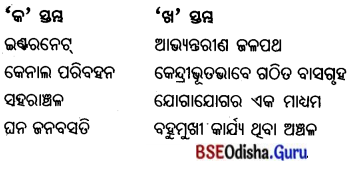
Answer:
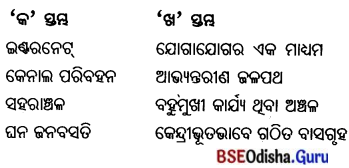
ପ୍ରଥମ ଯୋଡ଼ିକୁ ଦେଖୁ ଦ୍ଵିତୀୟ ଯୋଡ଼ି ପୂରଣ କର
1. ଅସ୍ଥାୟୀ ଜନବସତି : ପାର୍ବତ୍ୟଭୂମି :: ସ୍ଥାୟୀ ଜନବସତି : ____।
Answer:
ବାଣିଜ୍ୟ କେନ୍ଦ୍ର
2. ଗ୍ରାମ୍ୟ ଜନବସତି : କୃଷି :: ସହରାଞ୍ଚଳ ଜନବସତି : ____।
Answer:
ବ୍ୟବସାୟ
3. ହିମାଳୟ ପାର୍ବତ୍ୟାଞ୍ଚଳ ଭାରବାହୀ ପଶୁ : ଖବର :: ତିବ୍ବତ : ____।
Answer:
ଚମରୀଗାଈ
4. ସଡ଼କ ପରିବହନ : ଟ୍ରକ :: ରେଳ ପରିବହନ : ____।
Answer:
ଟ୍ରେନ୍

5. ସୁଏଜ କେନାଲ : ଇଉରୋପ ମହାଦେଶ :: ଉତ୍ତମାଶା ଅନ୍ତରୀପ ପଥ ____।
Answer:
ପଶ୍ଚିମ ଆଫ୍ରିକା ଦେଶ ଓ ଦକ୍ଷିଣ ଆମେରିକା ଦେଶ
6. ଏସିଆର ବନ୍ଦର : ସିଙ୍ଗାପୁର :: ଉତ୍ତର ଆମେରିକା : ____।
Answer:
ନିଉୟର୍କ
7. ଦକ୍ଷିଣ ଆମେରିକା ବନ୍ଦର : ରିଓଡ଼ି ଜେନିରୋ :: ଅଷ୍ଟ୍ରେଲିଆ : ____।
Answer:
ସିଡ଼ନୀ
8. ଦିଲ୍ଲୀ ବିମାନବନ୍ଦର : ପାଲାମ :: କୋଲକାତା : ____।
Answer:
ଦମ୍ବମ୍
9. ମୁମ୍ବାଇ ବିମାନବନ୍ଦର : ସାନ୍ତାକୁଜ :: ଚେନ୍ନାଇ : ____।
Answer:
ମୀନାମ୍ବକମ୍

10. ଓଡ଼ିଶା ବିମାନବନ୍ଦର : ଭୁବନେଶ୍ଵର :: କେରଳ : ____।
Answer:
ଥୁରୁଅନନ୍ତପୁରମ୍
11. ପ୍ରଥମ ଟେଲିଗ୍ରାଫ : ୧୮୫୧:: ପ୍ରଥମ ଟେଲିଫୋନ୍ : ____।
Answer:
୧୮୮୧
![]()
![]()
![]()
![]()
![]()
![]()
![]()
![]()
![]()


